1708 episodes
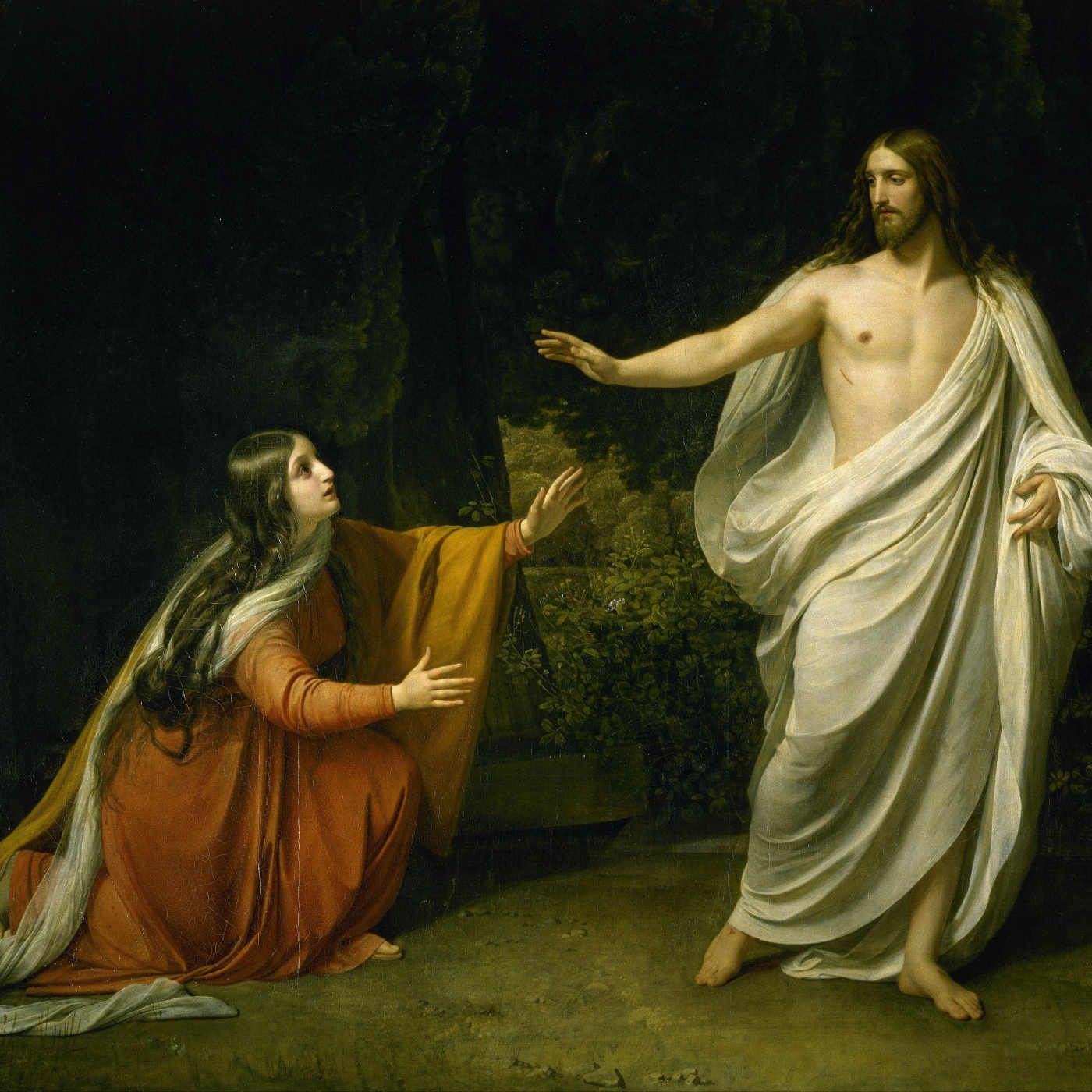

Jesus said to her, “Stop holding on to me, for I have not yet ascended to the Father. But go to my brothers and tell them, ‘I am going to my Father and your Father, to my God and your God.’” John 20:17 Mary of Magdala was one of the first persons to whom Jesus appeared. She was deeply devoted to Him, especially because of the great mercy He offered her when He forgave her manifest sins and expelled seven demons from her. After He had done that, Mary became a devout follower and was one of the few who remained faithful to Him, even as He hung upon the Cross. On the first day of the week, the Sunday after the Crucifixion, Mary came to the tomb to anoint Jesus’ body in accord with Jewish custom. But when she arrived, Jesus’ body was gone. And when Jesus appeared to her as she was weeping, she didn’t immediately recognize Him, for He had His new glorified body. But when Jesus spoke her name, Mary, she recognized Him. But rather than embracing her, Jesus said, “Stop holding on to me…” Why would Jesus say this? Even though Mary’s attachment and devotion to Jesus was beautiful and holy, it wasn’t yet perfected. She wanted her Lord Whom she had come to know and followed. She wanted her former relationship with Jesus to be returned to her. But for this reason, Jesus said, “Stop holding on to me…” Jesus wanted much more. He was telling her that her relationship with Him was soon to change for the better. No longer would He simply be her earthly companion; instead, He would soon live within her, dwell within her very heart, become one with her, and be her Bridegroom for eternity. But this could only happen once Jesus ascended to the Father in Heaven to complete His divine mission of salvation. At times, we also seek favors from our Lord that are purely temporal. Though we do need to trust Him for “our daily bread,” meaning, for all the basic necessities of life, we must realize that the gifts God wants to give us far surpass anything in this world. The supernatural gift of grace, the gift of the Indwelling of the Most Holy Trinity, the gift of oneness with our Lord is what we are made for and is the end goal and desire of our Lord. Reflect, today, upon these words Jesus spoke to Mary: “Stop holding on to me, for I have not yet ascended to the Father.” But do so with the knowledge that, now, Jesus has indeed ascended to the Father. Therefore, He now invites us all to cling to Him as He reigns in Heaven. Ponder the deep desire in the heart of our Lord that you cling to Him with every fiber of your being. He wants to dwell within you, to become one with you and to transform you in every way. This holy union is now being enjoyed for all eternity by Saint Mary of Magdala, and this same gift is being offered to you. Cling to Him and never let go, for this will be your eternal joy.
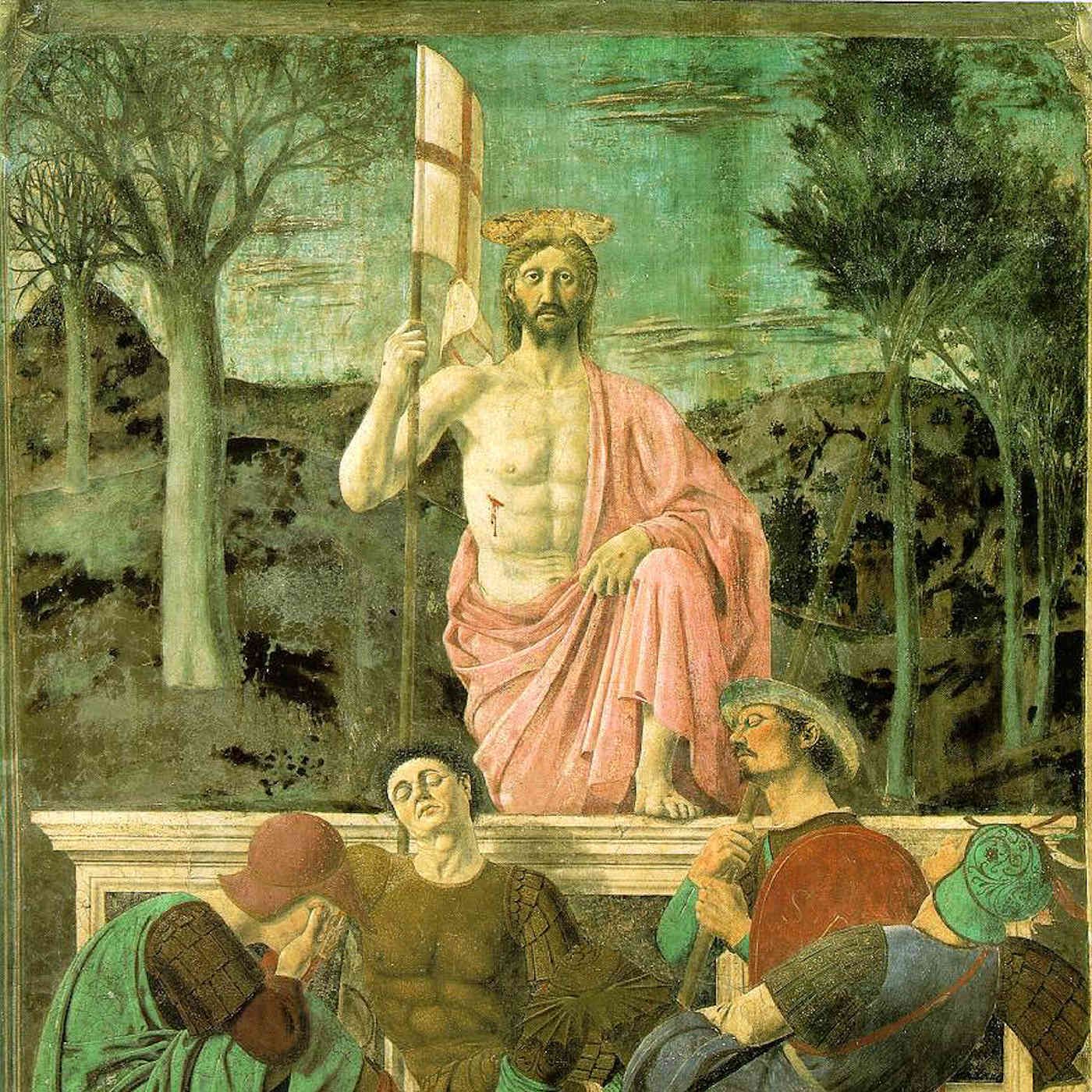

The chief priests assembled with the elders and took counsel; then they gave a large sum of money to the soldiers, telling them, “You are to say, ‘His disciples came by night and stole him while we were asleep.’ And if this gets to the ears of the governor, we will satisfy him and keep you out of trouble.” Matthew 28:12–14 The Lord of all rose from the grave, conquering sin and death, making it possible for us all to share in His glorious Resurrection! Death had lost. Satan had lost. The corrupt religious leaders had lost. And all those who believed in Jesus now had their eternal hope renewed. Sadly, though, what was the greatest victory ever known for humanity, a victory that opened the doors to eternal glory for all who believe, could not be accepted by the chief priests and elders of the people. They saw to His death, and, now that He had risen, they scrambled to do all they could to hide that truth. Pride is hard to overcome. When a person professes they are right, when in fact they are wrong, and when they are then confronted with their error, the sin of pride will inevitably tempt them to further sin. This is what we see today in this passage from our Gospel. The chief priests and elders were informed by the soldiers that when the women came to the tomb early in the morning, there was a great earthquake, and they saw an angel of the Lord descend from Heaven, roll back the stone, and sit on it. When they saw this, “The guards were shaken with fear of him and became like dead men” (Matthew 28:4). And after they heard the angel tell the women that Jesus had risen, the guards went off to tell the chief priests and elders. After all the miracles and powerful preaching of Jesus, you would think that the chief priests and elders would have believed. But they didn’t. And then, after hearing the testimony of these soldiers, you would think they would have fallen on their knees, repented of their hardness of hearts, and come to believe. But they didn’t. They doubled down in their sin and added sin upon sin. Some forms of sin can more easily be admitted, especially sins of weakness. When one is weak and falls, it may not be always easy to overcome that sin in the future, but it is easier to acknowledge it as sin when it is caused by human weakness. But a sin of weakness is much different than a sin of obstinate pride. Obstinate pride is not only hard to overcome, it’s hard to admit. It’s hard to admit our sin when it is based on our obstinacy and pride. As a result, this type of sin often leads to other sins such as ongoing deception, manipulation and anger. This is illustrated by these chief priests and elders. But if you can humble yourself and admit your sin when it comes from your pride, that humility can have a powerful and transformative effect upon your life. Reflect, today, upon these chief priests and elders of the people. Try to ponder their hardness of heart and the sad situation they found themselves in as they attempted to cover up their error and sin. Resolve never to fall into this form of sin yourself. However, if this is a struggle for you, seek humility so that you can be freed of this heavy burden by the grace of the Resurrection of our Lord.
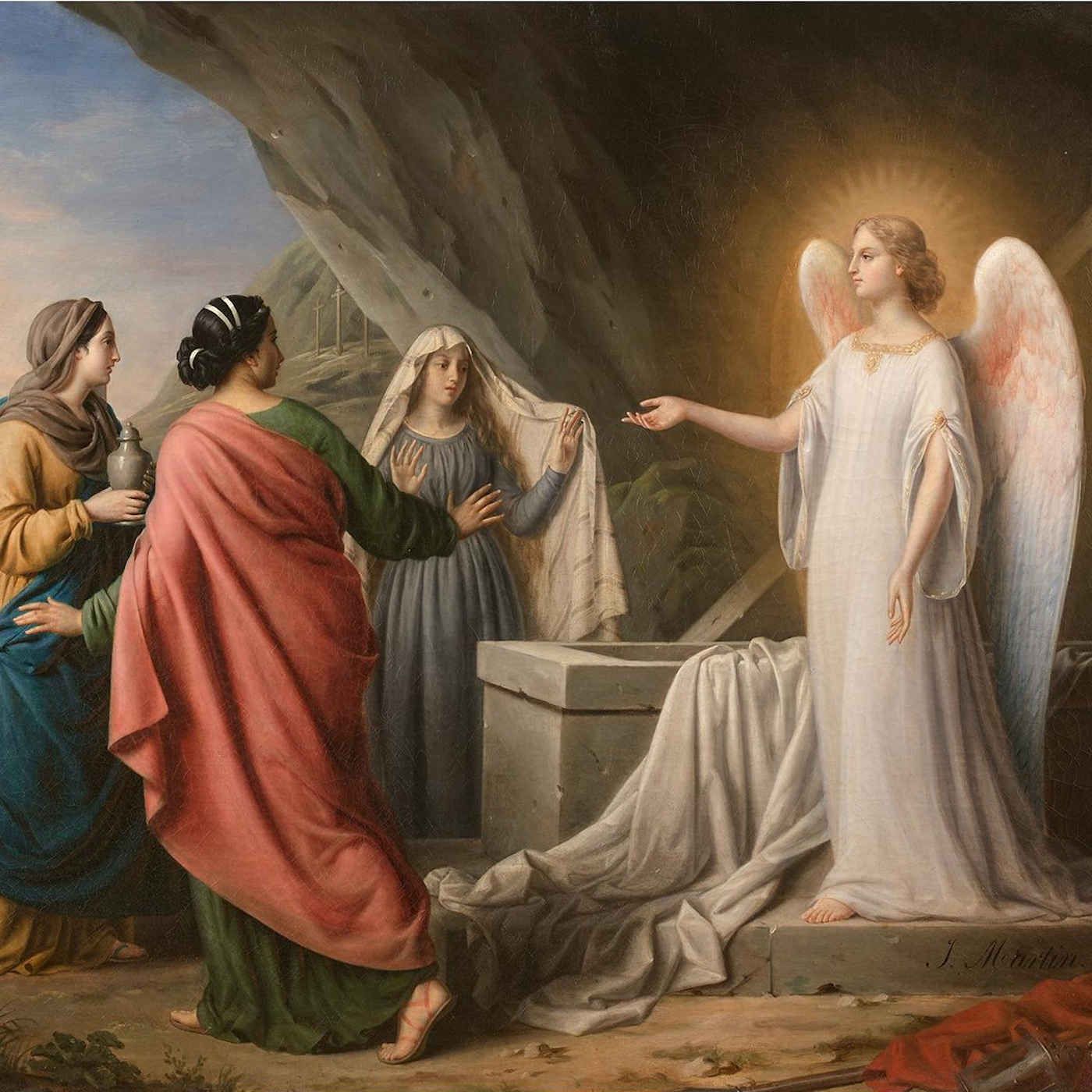

“Do not be afraid! I know that you are seeking Jesus the crucified. He is not here, for he has been raised just as he said. Come and see the place where he lay. Then go quickly and tell his disciples, ‘He has been raised from the dead, and he is going before you to Galilee; there you will see him.’ Behold, I have told you.” Matthew 28:5–7 The Lord has truly risen! Alleluia! Sin and death have been destroyed, and new life has been offered to all who cling to the Savior in faith. What a glorious day we celebrate today! Matthew’s Gospel, quoted above, is read at the Easter Vigil Mass. Prior to the reading of this Gospel are seven Old Testament readings, each followed by a psalm, as well as a New Testament reading, another psalm and the Gospel. There are seventeen readings in all at the Easter Vigil! For that reason, the Easter Vigil is called “the mother of all vigils.” Though many people have not had the opportunity to participate in the Easter Vigil, it is helpful to understand it, because its structure and length reflect the awe and wonder we must have at the Resurrection of Christ. The Easter Vigil Mass begins in darkness, after the sun sets, with all the lights out in the Church. Outside, a new “blazing fire” is lit and blessed that symbolizes the Light of Christ that dispels all darkness. From that fire, the Easter candle and other candles held by the faithful in the church are lit, and the new light illuminates the church. The procession into the church with the candles is followed by the singing of the ancient hymn the . That hymn is the Church’s announcement of the Resurrection of Christ and is filled with profound theology, presented with youthful excitement and amazement. The tabernacle remains empty as a way of inviting the faithful to anticipate the celebration of the Eucharist once again. The lengthy Liturgy of the Word follows, as it recounts the history of God’s plan of salvation. Finally, the Sacraments of Initiation are celebrated within the Mass that culminates with the celebration of the Most Holy Eucharist. Why is so much solemnity given to this celebration? Because Easter is worth it! Nothing ever has been and nothing ever will be more glorious than the triumph of the Son of God over sin and death. Easter must fill us with awe and wonder. Because of His death and Resurrection, our lives are changed forever. Therefore even if you are not able to participate in the “mother of all vigils,” try to learn the lessons this vigil teaches. Among the many lessons we can learn from the Easter Vigil is that God’s glorious plan of salvation unfolds over time and then culminates with glory beyond imagination. This is especially depicted through the many readings in the Liturgy of the Word. The first reading for that Mass comes from Genesis and recounts the six days of creation. We then read the story of Abraham, our father in faith, and how his trust in God was tested when he was told to offer his son Isaac as a sacrifice, in a prefiguration of the Father in Heaven offering His only Son for us all. We then read the story of Moses leading the people out of Egypt from slavery through the Red Sea. The waters of the Red Sea are a symbol of Baptism that crushes sin and leads us to freedom. Readings from the prophets Isaiah, Baruch and Ezekiel follow, revealing the unfolding of God’s promise of the gift of salvation to come. At times in life, we can become impatient. We tend to want what we want when we want it. But the lesson of the Holy Scriptures is that God’s plan is not only perfect but is also fulfilled only in accord with God’s timing. This is His perfect wisdom. It’s a wisdom that we cannot always comprehend. In the end, if we embrace the perfect plan of God in our lives, we will share in the Resurrection of Christ. Nothing could ever be better than this. There is nothing that this world can offer us that even comes close to the glorious reward of sharing in the Resurrection of Christ. As we celebrate the great Solemnity of Easter, reflect, today, upon the fact that God’s plan for your life is perfect. It’s a plan that God wants to unfold for you one step at a time. The end result is the glory of the Resurrection! It’s a life of perfection with Him in Heaven when every tear will be wiped away. It’s a plan that removes every sin, sorrow and suffering, and leads you to the fullness of joy. The way to embrace that plan is to take one step at a time as God leads. Little by little, God wants to change you, free you, forgive you, strengthen you and set you on the path to glory. Believe in the most awe-inspiring glory that you could ever share in. Believe in the promise of the Resurrection. Make sharing in it your one and only goal in life, and let God lead you down that path, one step at a time.


The Savior of the World died a cruel death upon the Cross. His broken body was laid in the tomb. His disciples scattered and were fearful that they would be next. But our Blessed Mother kept vigil in the perfect hope that her Son would soon rise. Traditionally, Saturdays within the Church year are dedicated to the Blessed Virgin Mary. This ancient tradition developed in part due to the belief that, as others were filled with fear and confusion, Mother Mary kept vigil on Holy Saturday in prayerful anticipation of Jesus’ resurrection. She knew her Son would rise. She had hope beyond hope. Her faith was certain. Her love kept her vigilant as she awaited the return of her Son. For many centuries, it has been suggested that the first person to whom Jesus appeared after His Resurrection was His own mother. Pope Saint John Paul II believed this. Saint Ignatius of Loyola believed it. And many others throughout the centuries shared this belief. For these reasons, Holy Saturday is an ideal day to ponder the pondering heart of our Blessed Mother. There are several times in Sacred Scripture where we are told that Mother Mary pondered the mysteries of her Son’s life in her heart. She was one of the few who stood by Him in His agony and death. She stood before the Cross and prayerfully pondered His perfect sacrifice. The Blessed Mother held His dead body in her arms and pondered where His spirit had gone. And today she keeps vigil, pondering His imminent return to her. Ponder her pondering heart. Try to unite your own heart with hers. Try to understand what she was thinking and hoping. Try to feel what she felt this sorrowful day. Try to experience her faith, her trust and her joyful expectation. So many people in this world walk in despair and confusion. So many have lost hope in the new life that awaits them. So many have their own form of interior death without allowing God to draw them into His Resurrection. So many people today need the hope that was so alive in the heart of our Blessed Mother that first Holy Saturday. Ponder the reality of Holy Saturday in silence this day and allow the glorious heart of our Blessed Mother to inspire you and draw you more deeply into her life of faith, hope and love.
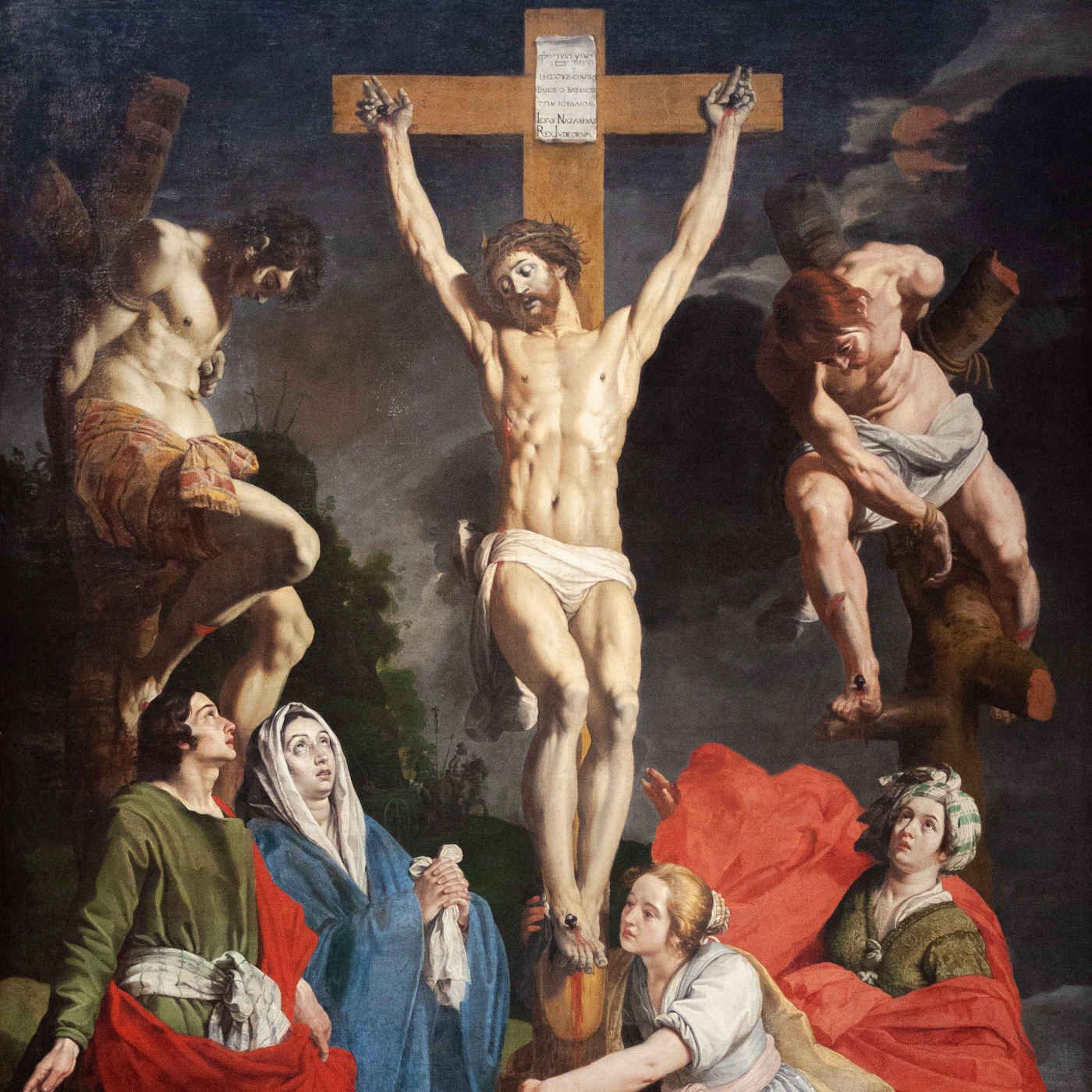

After this, aware that everything was now finished, in order that the Scripture might be fulfilled, Jesus said, “I thirst.” There was a vessel filled with common wine. So they put a sponge soaked in wine on a sprig of hyssop and put it up to his mouth. When Jesus had taken the wine, he said, “It is finished.” And bowing his head, he handed over the spirit. John 19:28–30 Consider the thirst of Jesus. Though His physical thirst must have been excruciating as He hung upon the Cross, pouring forth His precious blood upon the world, the spiritual thirst our Lord felt would have greatly overshadowed His physical thirst. His spiritual thirst is for you, for your soul, for your salvation. As He hung upon the Cross, Jesus did not think of Himself, His suffering or His wretched physical condition. Instead, He thought of you and of all those for whom He was giving His life. Psalm 69:22 says, “Instead they gave me poison for my food; and for my thirst they gave me vinegar.” Jesus fulfilled this Scripture passage as He thirsted on the Cross. The vinegar symbolically refers to each one of us. The vinegar given to our Lord on the Cross was spoiled wine. Each one of us, symbolically speaking, is this spoiled wine. The purity of our humanity has been corrupted by original sin. As a result, we are not the people God intended us to be by nature. But in our fallen state, we have the potential to satiate Jesus’ spiritual thirst. As you think about your own life, what do you see? Can you see yourself as spoiled wine? Perhaps it is a bit humiliating to think of yourself this way. But humility is good, especially when we understand that our Lord longs for us in our brokenness. Upon the Cross, Jesus did not cry out for the best of wine, the finest and most delicious. As He thirsted on the Cross, He longed to be satiated by you, in your weakened and broken state, just as you are, so that He can pour forth His cleansing mercy upon you. As soon as Jesus tasted the sour wine, He cried out, “It is finished.” This symbolically represents His soul being satiated by you every time you turn to Him in your need. It’s amazing to consider the fact that you have the ability to console the Heart of Jesus and satiate His thirst this way. Saint Thérèse of Lisieux was very fond of a devotion dedicated to consoling Jesus’ Heart. As a child, she was given a prayer card that pictured Jesus in prison, looking out at one small flower. Thérèse saw herself as that one small flower who was given the mission to console Jesus’ Heart by visiting Him regularly in the prison of the tabernacle. Spiritually speaking, that moment of Jesus’ thirst on the Cross permeates all time and continues today. Every time you come to Him in your need, especially when you come before Him in the Eucharist, He turns His eyes to you and calls to you, inviting you to console Him by offering Him the humility and brokenness of your life. Today our churches are empty. The Blessed Sacrament has been removed. As a result, we should seek to satiate the thirst of our Lord by thirsting for His divine presence that will return on Easter when the Mass is celebrated once again. Today is a day to grow in our desire for the presence of our Lord in our lives. We must allow ourselves to feel His loss, experience His death, and mourn His suffering. As we do, we must open ourselves to a deep spiritual longing to consume His broken Body and precious Blood once again. Doing so will not only prepare us to be satiated ourselves, it will also enable us to satiate the Heart of our Lord. Reflect, today, upon Jesus on the Cross. Gaze at Him as He gazes at you. See the longing in His Heart for you. Know that He gave His life for you, so that you could receive the gift of new life. Know, also, that your openness to this gift of His life poured out for you will console our Lord’s Heart and bring His divine mission of salvation to fruition. Satiate our Lord’s thirst today so that He can once again say, “It is finished.”
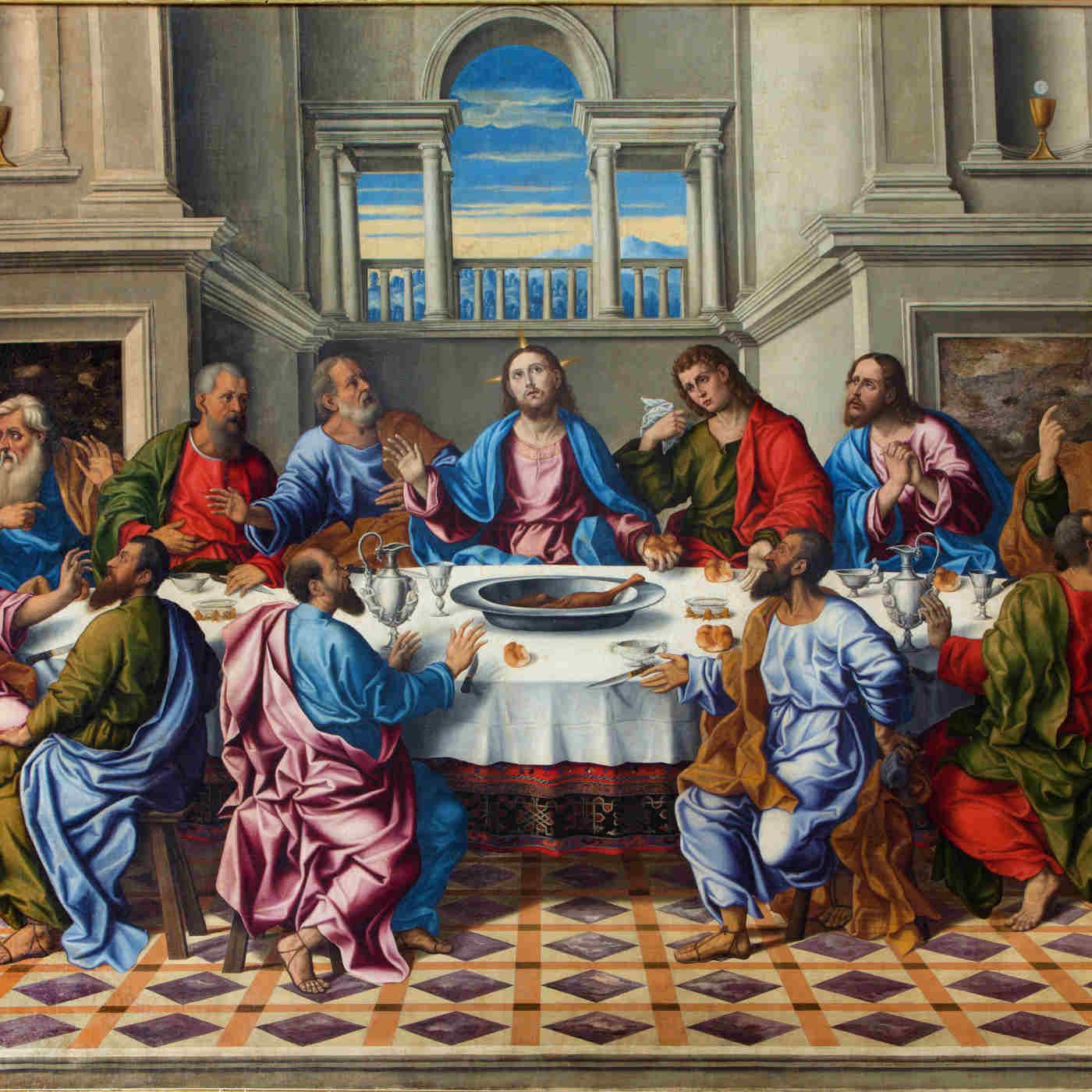

“This day shall be a memorial feast for you, which all your generations shall celebrate with pilgrimage to the LORD, as a perpetual institution.” Exodus 12:11 The holy Triduum begins. Today we fulfill this Old Testament passage, revealing that the Passover would become “a perpetual institution.” This passage concludes our First Reading instruction from the LORD given to Moses and Aaron on how to prepare for the Israelites’ liberation from Egypt. Plague after plague had been inflicted upon the Egyptians, and none of them resulted in the Israelites being set free. Therefore, the LORD instructed the Israelites to celebrate the first Passover by killing a year-old lamb, sprinkling its blood on their doorposts, and feasting on the flesh in preparation for the journey to the Promised Land. Today, we continue this Passover celebration as we share in the Sacrifice of the Lamb of God, Whose Blood has been shed, Whose flesh we consume, and Who leads us through the desert of life to the new and eternal Promised Land of Heaven. Just as the first Passover was a prefiguration of the Sacrifice of the Lamb of God, so also the plagues that led up to the Passover present us with much meaning. At first, all the water in Egypt turned to blood. Then frogs, gnats, flies and pestilence covered the land. Boils covered the skin of humans and animals. Hail rained down, locusts covered the land, and finally darkness covered the land for three days. None of these plagues was ultimately successful in convincing Pharaoh to let God’s people go; therefore, the final plague to be inflicted was the death of the firstborn. It was the blood of the paschal lamb, sprinkled on the doorposts of the Israelites’ houses that signaled to the angels to pass over their homes. The plagues inflicted on Pharaoh and the Egyptians were severe. But because of their obstinacy, God continued until they changed. Recall, also, that even after the Israelites were set free, Pharaoh changed his mind and pursued them into the Red Sea where his army perished. Though these prefiguring events might not be that pleasant to consider, they must be reflected upon. We must see in them God’s tireless and relentless efforts to set us free from sin. The obstinacy and oppression of Pharaoh are clear signs of the oppressive evil within our world today, and within our own souls. When we seek to embrace the freedom to which we are called, we will be met with much temptation and oppression from the evil one, as well as from our own fallen human nature. But if we trust in God, as Moses did, then we will be given all we need to begin the journey to freedom. Most specifically, the Flesh and Blood of the Son of Man is our Paschal Lamb. The Eucharist, which was instituted on Holy Thursday, protects us from the final death. Consuming the Body of Christ also strengthens us for our spiritual journeys. Without it, we have no protection from the evil one and lack the strength we need to be faithful on our journey. Reflect, today, upon God’s incredible commitment to set you free. He came to earth, took on human form, offered His life in sacrifice, and now feeds you with His sacred flesh. Without the Eucharist as your spiritual food and His Sacred Blood covering you, you will not survive. We all need the Eucharist. We need the Bread of Heaven. We need the Body and Blood, Soul and Divinity of the Savior of the World. God went to the greatest length to save you. Accept His Gift that we especially commemorate and participate in today.
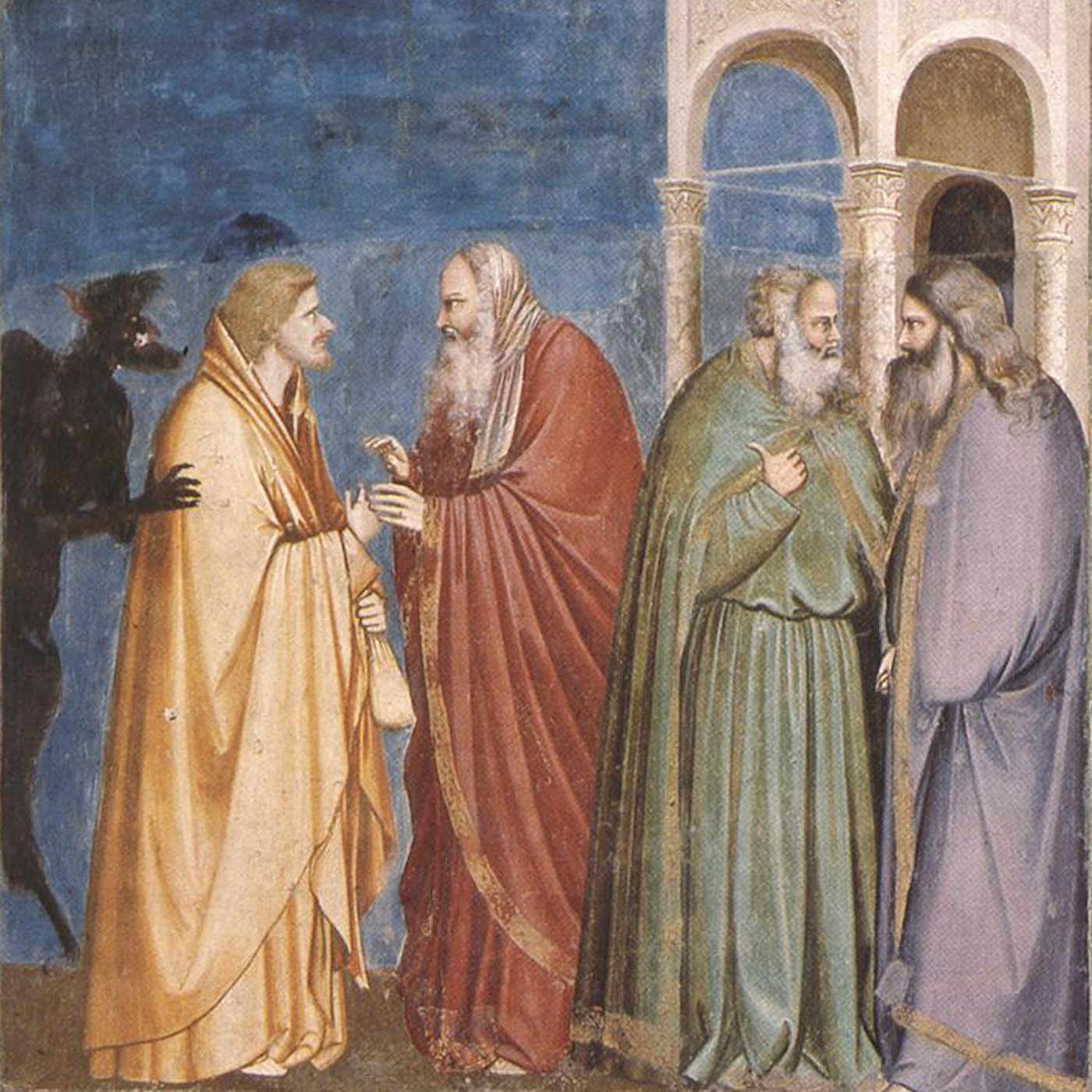

One of the Twelve, who was called Judas Iscariot, went to the chief priests and said, “What are you willing to give me if I hand him over to you?” They paid him thirty pieces of silver, and from that time on he looked for an opportunity to hand him over. Matthew 26:14–16 The desire for money can become a powerful incentive to betray our Lord. In this Gospel passage, it seems clear that Judas’ betrayal was based on his desire for money. He most likely had some level of faith in our Lord, or he wouldn’t have become His disciple. But even if Judas did have some level of faith, his desire for money appeared to overshadow the faith he may have had. One of the central lessons we can learn from Judas is that the desire for money is a powerful incentive for the decisions we make. So many of the great saints have taught us that the path to holiness consists, first, in a purification of all our disordered affections. And since one of the most powerful attachments that many struggle with is an attachment to money, this is an important desire to purify in all of our lives. It’s true that material possessions are not evil when they are used for the fulfillment of God’s will. But the desire for more, for an excess, will always cloud our ability to see clearly the will of God and live for His glory alone. Once Judas had betrayed our Lord and Jesus was arrested, recall that Judas “deeply regretted what he had done.” And during Jesus’ trial, Judas went back to the chief priests and said “I have sinned in betraying innocent blood” in an apparent attempt to stop the trial. But Jesus’ death was set in motion and could not be stopped. As a result, Judas returned the money and sadly went off to hang himself (See Matthew 27:3–5). The desire Judas had for money clouded his thinking. And his sin did to him what sin always does. As soon as his sin of betrayal was done, Judas saw the consequences of that choice. And the consequences grieved him deeply. He learned that choosing sin ends with an empty promise. He realized that thirty pieces of silver was not worth the value of his soul. But of course, even then Judas could have repented and received the mercy of God. But he didn’t. He simply ended his life in ultimate despair. Reflect, today, upon the witness of Judas. Use him as a source of meditation and self-examination this Holy Week. What is it in your life that you desire more than our Lord? What temptation clouds your thinking and leads you to choices that you know will end in emptiness? Strive to eradicate every disordered desire within you this day and choose wisely the will of God instead. Do not let yourself continue to believe the lies that keep you from making Jesus and His holy will the one and only focus of your life.
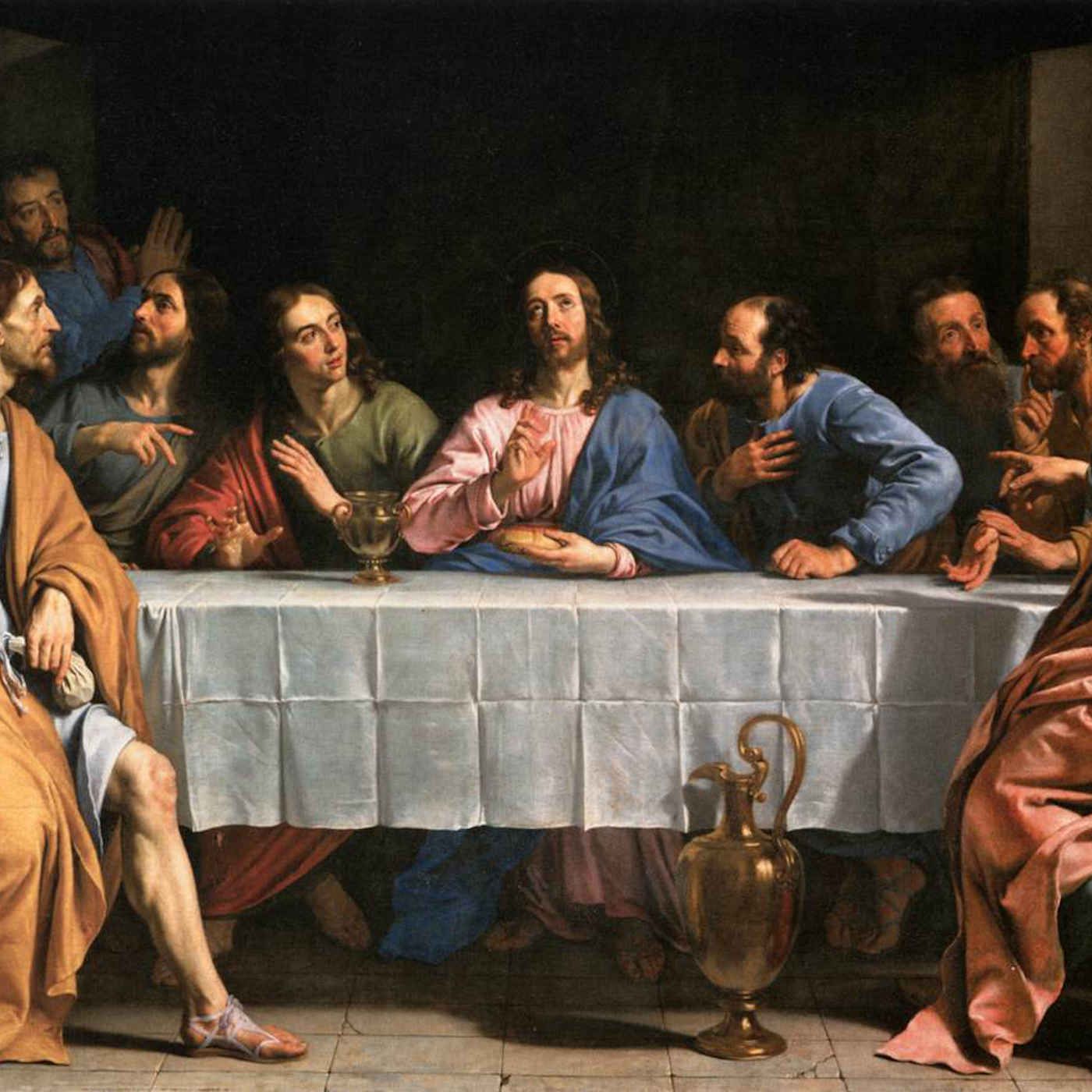

“Now is the Son of Man glorified, and God is glorified in him. If God is glorified in him, God will also glorify him in himself, and he will glorify him at once.” John 13:31–32 Jesus speaks this line about Himself being glorified immediately after Judas leaves the supper to go forth to betray Him. Jesus had just finished washing the feet of His disciples, and soon He would finish the Last Supper, go to the Garden of Gethsemane, be arrested, beaten and crucified. And this was to all take place through the betrayal of one of the Twelve. Yet rather than speak of these pending events in a fearful or anxious way, Jesus points to the glory He will receive through them. Everything in life has the potential to become an instrument of the glory of God. Even our sin can end in God’s glory when we repent and receive God’s forgiveness. It will not be our sin that glorifies God but His mercy poured forth from the Cross upon us that gives Him glory. The same is true with the events of Holy Week. When looked at from a purely human perspective, what Jesus endured was tragic and horrific. One of His closest companions betrayed Him. The religious leaders of the time betrayed Him. The civil authorities betrayed Him. And all of the disciples except John fled in fear as Jesus was betrayed. But Jesus did not look at any of this through human eyes alone. He saw it all from the eternal perspective and clearly taught that all of these seemingly tragic events would end in His glory. When we commit ourselves to the following of Christ, we can be assured that we will also share in His Cross. We will experience the sins of others, encounter mistreatment, and have to endure various sufferings. The question for us all as we have these encounters in life is whether we will endure them in anger and despair or with the hopeful confidence of our Lord. Again, everything in life has the potential to become an instrument of the glory of God. Nothing in life has the power to steal away that glory when we keep our eyes upon the will of God and His power to use all for His glory. Reflect, today, upon your call in life to see everything from the divine perspective. If you are upset, angry, despairing or confused at times, know that God wants to bring clarity and grace to every situation. He wants to show you how you can share in His divine mission of transforming every evil into God’s glory. Seek out the ways that your life must give glory to God in everything, especially those things that seem incapable of being used for good. The more an experience in life seems incapable of being used for God’s glory, the more that experience is capable of giving true glory to God.
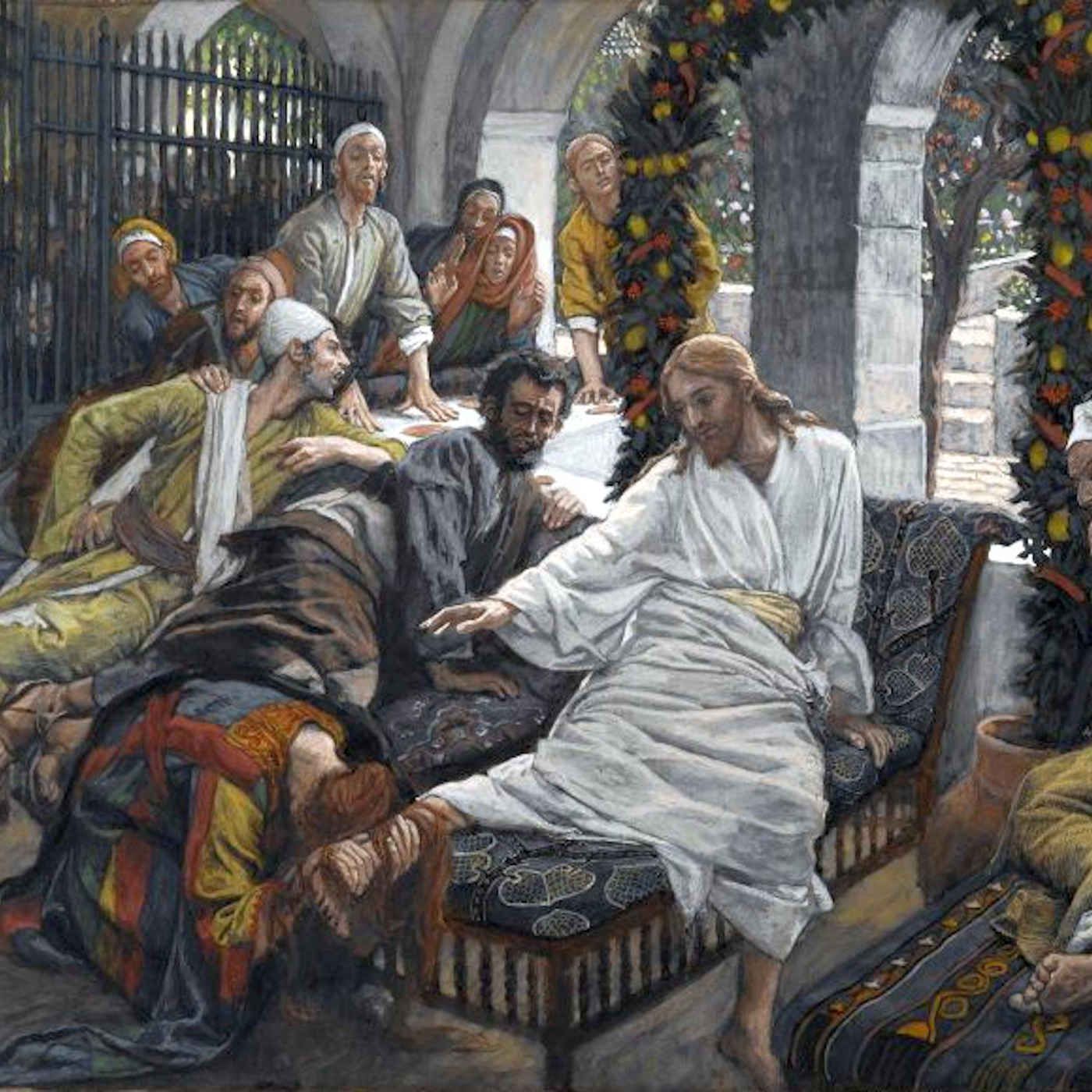

Then Judas the Iscariot, one of his disciples, and the one who would betray him, said, “Why was this oil not sold for three hundred days’ wages and given to the poor?” John 12:4–5 Jesus was with His disciples at the home of Lazarus, Martha and Mary. He regularly spent time at their home and was close to them. This meal took place just before Jesus entered into Jerusalem for the first Palm Sunday and Holy Week. It was six days before Jesus would die on the cross. Recall that Lazarus had recently been raised from the dead by Jesus and also that Mary, Lazarus’ sister, was deeply devoted to Jesus and is recorded as the one who sat at His feet, while her sister Martha served. During this visit, Mary offered another act of devotion to Jesus when she anointed Him with “a liter of costly perfumed oil.” She offered Him an act of love and devotion. The Scripture passage above records Judas’ response as he also was at the meal. Jesus rebukes Judas and defends the act of devotion given by Mary, and the meal continues on. One clear lesson this teaches us is that nothing is too good for our Lord. It’s true that we must do our part to help care for the poor, but Jesus’ response to Judas is quite interesting. He says, “Leave her alone. Let her keep this for the day of my burial. You always have the poor with you, but you do not always have me.” Jesus was not downplaying the importance of caring for the poor; He was emphasizing the importance of offering acts of love and devotion to Him. As we enter into this the holiest week of the year, we are given this image of Mary lavishing upon Jesus this liter of costly perfumed oil as a way of inviting us to do the same. Though we serve Christ in others who are in need, we must also seek to regularly offer Him devotion and love directly, even in ways that others may think is excessive. Honoring Him, expressing our love, spending time with various devotions, praying for extended periods of time, and even offering Him our financial resources are all ways in which we give Jesus the glory that is due Him. Reflect, today, upon ways in which you can imitate this act of loving devotion offered by Mary to Jesus. In what ways can you pour forth in an abundant way your time, money, talents, and energy upon our Lord? How can you best express your devotion to Him this Holy Week? Seek out ways to do this directly for the one and simple reason that you love our Lord and want to express that love this week.
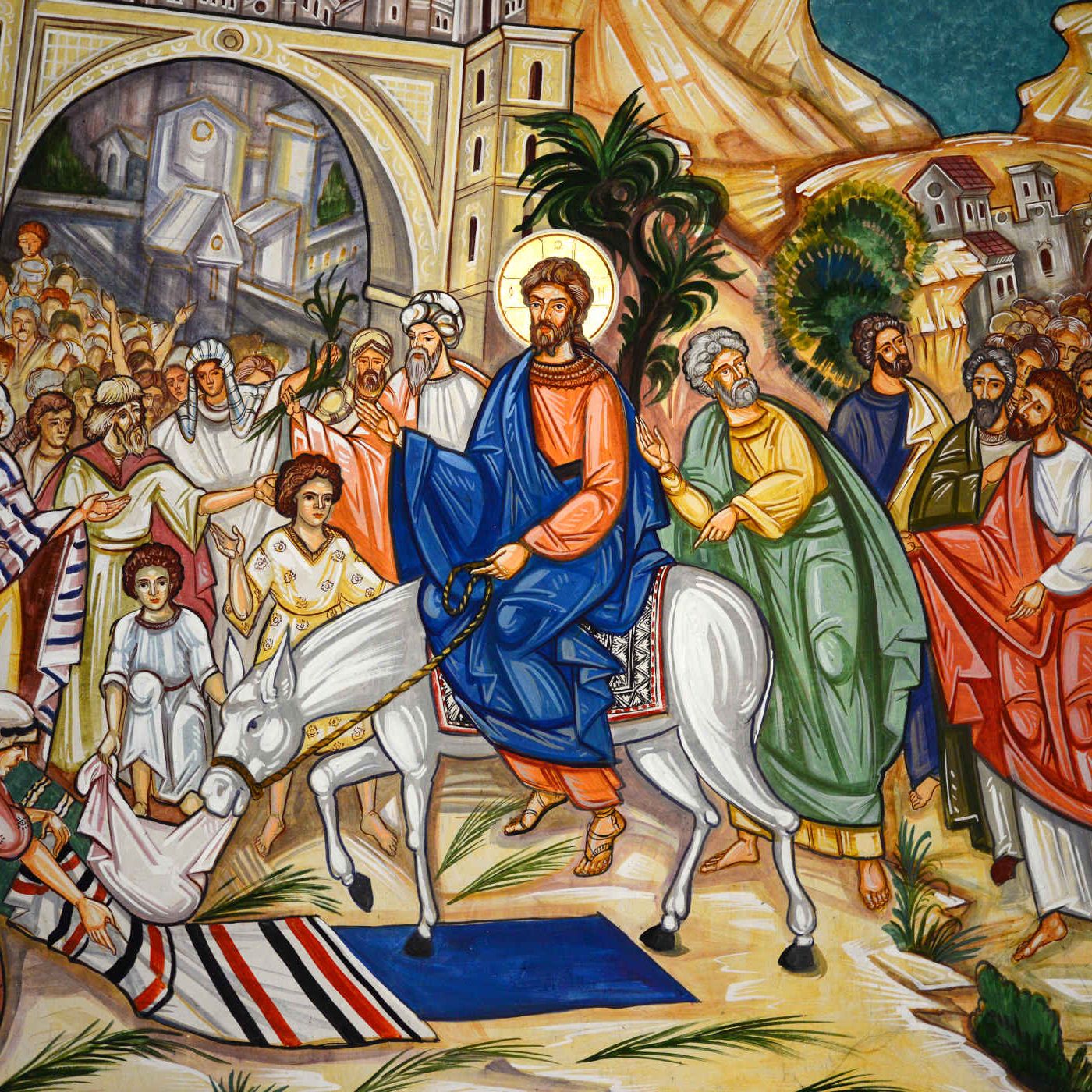

Those preceding him as well as those following kept crying out: “Hosanna! Blessed is he who comes in the name of the Lord! Blessed is the kingdom of our father David that is to come! Hosanna in the highest!” Mark 11:9–10 Throughout Jesus’ life, He traveled to Jerusalem many times. As a child, He was presented in the Temple. At age twelve, He was found teaching the teachers of the Law in the Temple. As He grew, He made regular pilgrimages to the Temple. During His temptation in the desert, the devil took Him to the pinnacle of the Temple. In the Gospels, we read of at least four different trips to the Temple during Jesus’ public ministry. However, the trip to Jerusalem that we commemorate today was unlike any other. As Jesus entered Jerusalem this time, His life was already being sought by the religious leaders. Despite that fact, Jesus entered Jerusalem with great solemnity and with much attention. “Hosanna! Blessed is he who comes in the name of the Lord!” was the cry by the crowd as Jesus rode into Jerusalem on a donkey while palm branches and cloaks were strewn before Him. Though this was the most fitting way for the people of faith to welcome their King, their warm welcome, their cries “Hosanna!” and their excitement were more beneficial to them than they were to Jesus. Jesus is God. He has no need of our praise and honor. But Jesus came to us to invite us to praise, honor and worship Him because it is good for us. We need to praise Him. This is what we are made for. This leads to the fulfillment of our lives. As we begin Holy Week, try to spend time with this image of the people honoring our Lord with much enthusiasm. This is an image depicting who we must become. As we continue through this Holy Week, we must become increasingly aware of the God to Whom we offer our praise and worship. He is a God Who lowered Himself in the eyes of all, took on the form of a slave, permitted Himself to be labeled as a grave sinner, was rejected, beaten and killed. This week, especially, we worship the suffering Christ. We worship a Man Who was arrested and cruelly treated. We worship a Man who was hated and mistreated in the worst way possible. Our wholehearted worship of the suffering Christ is an important act to fulfill. In many ways, it is easier to worship God as He is in Heaven on His glorious throne. When we ponder the myriads of angels gathered around Him, the saints of all time bowing to the ground and glory and splendor radiating from His face, worship seems right. To worship a Man accused of being a criminal and suffering capital punishment while enduring the hatred of many is more difficult to comprehend. But if we are able to see Jesus through the eyes of faith and peer through the hatred and lies that surrounded Him, then we will be in awe of the humility of our God Who came to us this way. Our worship of the suffering Christ also invites us to share in His virtue as He endured all that was inflicted upon Him. When we worship the humiliated Christ, our humiliations take on new power and meaning. When we worship the suffering Christ, our sufferings are elevated to share in His redemption. When we worship the rejected, despised and persecuted Christ, any ways that we share in these hardships are transformed. Reflect, today, upon the God Whom you worship this Holy Week. Do not shy away from all that Jesus endured. Gaze at His rejection and passion. Look at the hatred He endured. As you do, see not only your glorious God, see also the remedy for all your ills. God descended to us in this most humble form so that He could meet us where we are at and raise us to new life with Him.
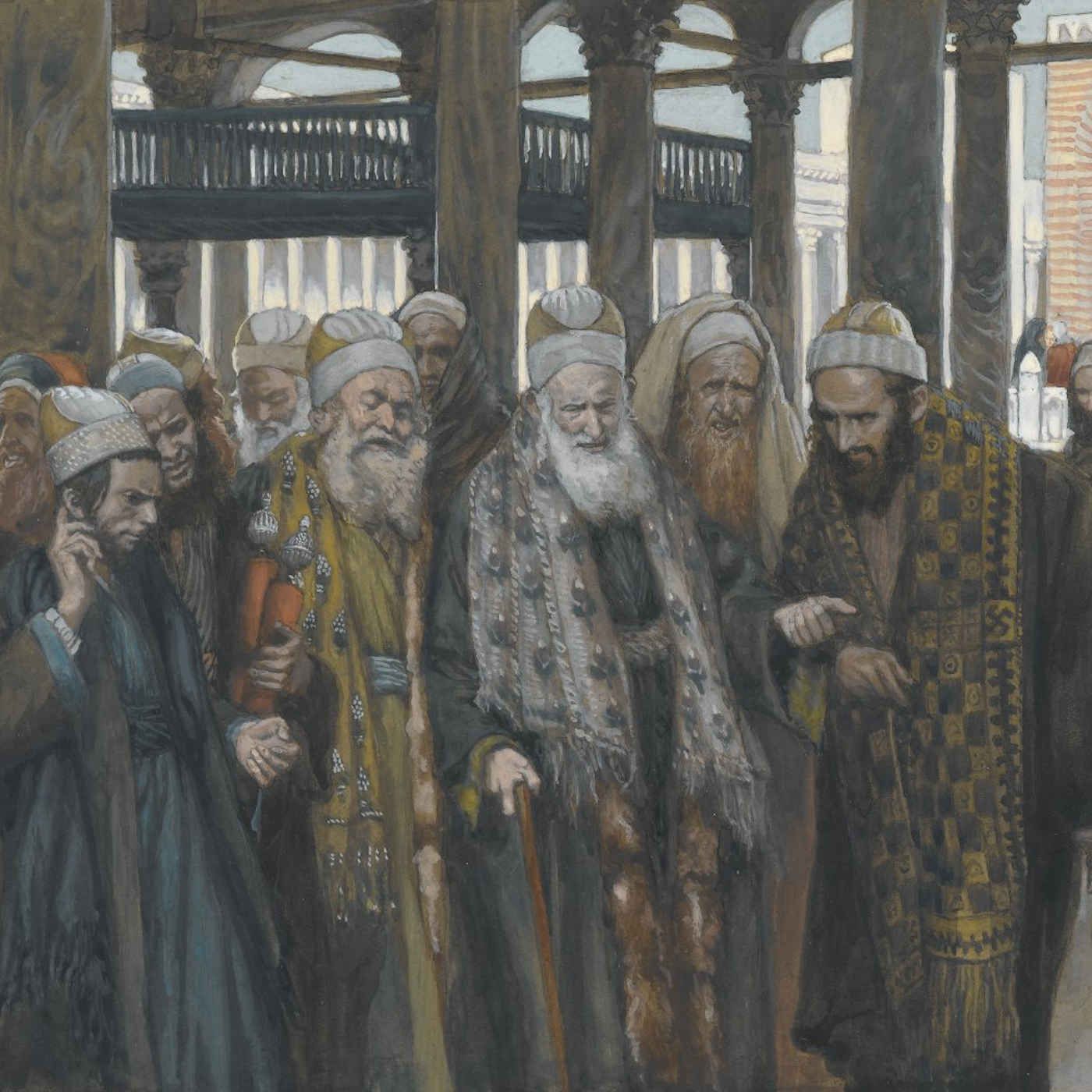

So the chief priests and the Pharisees convened the Sanhedrin and said, “What are we going to do? This man is performing many signs. If we leave him alone, all will believe in him, and the Romans will come and take away both our land and our nation.” John 11:47–48 Jesus’ public ministry had two primary effects upon the people. For many, they were coming to believe in Him and were hanging on His every word. They sought Him out and began to understand that He was the promised Messiah. This was the response of faith. But the reaction of the chief priests and the Pharisees was far more worldly. In the passage above, we see a group of religious leaders who are completely consumed with worldly concerns to the point that these concerns drown out all matters of faith. As the Sanhedrin convened and discussed what they should do, Caiaphas, the high priest that year, spoke up and gave advice that perfectly depicts this worldly vision. He said, “You know nothing, nor do you consider that it is better for you that one man should die instead of the people, so that the whole nation may not perish.” Caiaphas and many other religious leaders at the time appeared to be far more concerned with their worldly status and power than they were with matters of true faith and eternal salvation. If they were men who deeply loved God and sought only His holy will, then they would have rejoiced that Jesus’ ministry was so fruitful in the lives of the people. They would have offered thanks to God, day and night, for the privilege of seeing the prophecies of old about the Messiah come to fruition before their own eyes. They should have had joy and gratitude, and they should have allowed those spiritual blessings to grow within them and give them the courage they needed to go forth and die with our Lord if necessary. But instead, they chose their comfortable lives and worldly status above the truth, and they decided that Jesus needed to die. One beautiful truth to reflect upon within this context is that God uses all things for His glory and for the salvation of those who believe. With this meeting of the Sanhedrin, these men began to plot the death of Jesus. Eventually they used deceit, manipulation, intimidation and fear to accomplish their goal. But even though from a worldly perspective these misguided religious leaders “won,” from a divine perspective, God used their evil to bring about the greatest good the world had ever known. Through their malice, Jesus’ passion and death gave way to the new life of the Resurrection. Reflect, today, upon the fact that God is able to use all things for our good. Be it in the midst of corruption, persecution, discord, sin, illness or any other evil in life, when we turn to God in faith and surrender, He is able to transform all things and bring forth an abundance of good fruit through them if we only let Him and trust in faith. Prayerfully surrender over to God, today, any of the above concerns that have affected you, and allow yourself to believe the simple truth that nothing can keep you from the glorious fulfillment of the will of God. All things can help toward the salvation of your soul and end in God’s eternal glory.
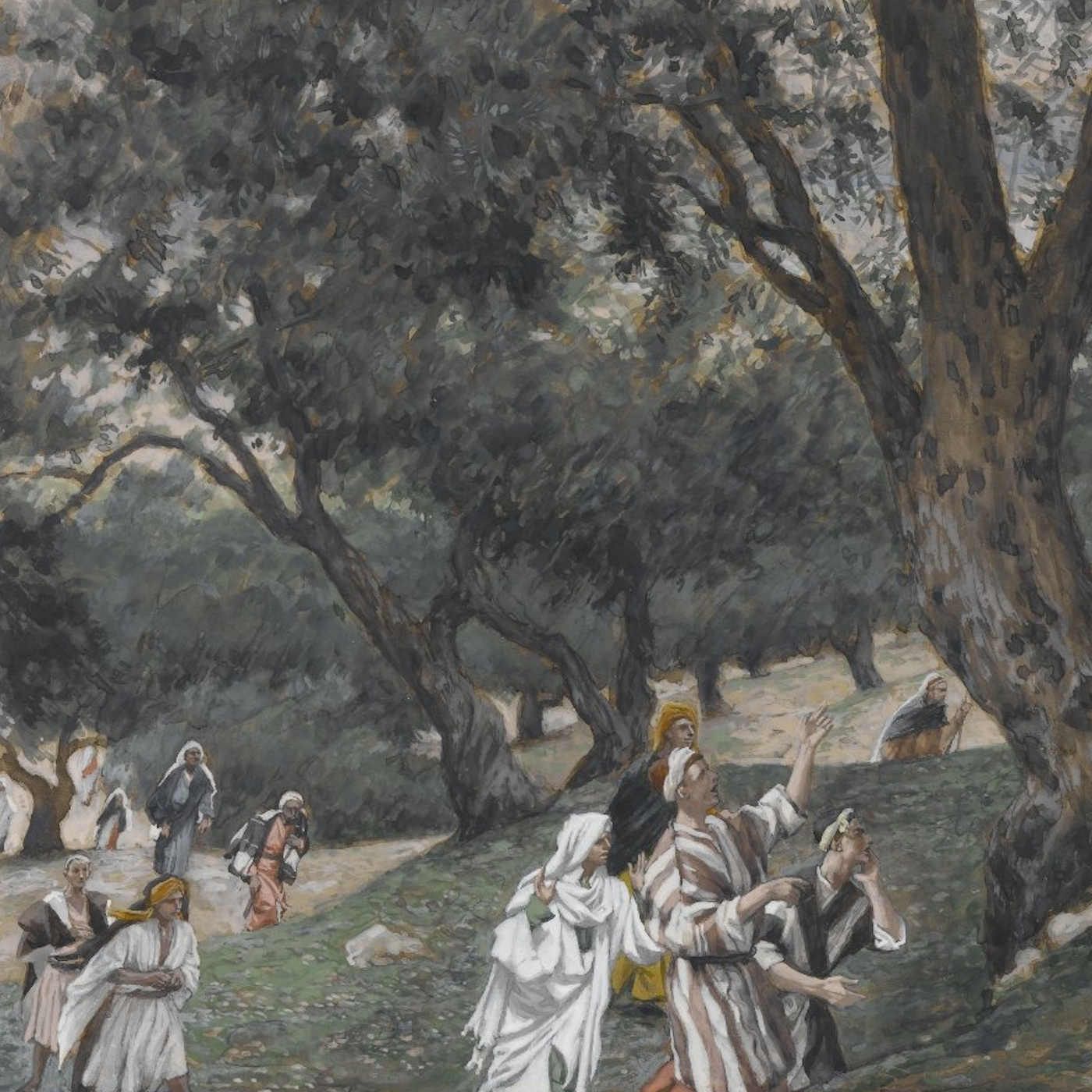

“If I do not perform my Father’s works, do not believe me; but if I perform them, even if you do not believe me, believe the works, so that you may realize and understand that the Father is in me and I am in the Father.” John 10:37–39 These words spoken by Jesus took place during the feast of the Dedication in Jerusalem. Jesus had been preaching clearly about His relationship with the Father in Heaven, and this was causing some to become outraged to the point of them trying to arrest Him right then and there. But He escaped and went back into the wilderness where He had been baptized by John. As Jesus remained there in the desert, many people came to Him to be with Him and to listen to His words. As they listened, they began to believe. It’s interesting to note the contrast of reactions. In Jerusalem within the Temple area, among large crowds gathered for the feast of the Dedication, Jesus was increasingly rejected and persecuted. But when He returned to the desert and people had to come to see Him, they listened and believed. This contrast presents us with one way in which we will more easily grow in our faith and help others grow in their faith. Specifically, we are invited to go into the “desert” to encounter our Lord, away from the busyness of life, and we must also invite others to join us in such a journey. It’s true that, while in Jerusalem, there were people who happened to stumble upon Jesus as He was teaching and were moved by His word and came to believe. But it’s also clear that, when people had to commit to the effort of seeking Him out in a deserted place, His words were even more transformative. In our own lives, within the ordinary activities of life, such as regular attendance at Mass, we will be given the opportunity to hear the Gospel and deepen our life of faith. But all of us need to take time to seek Jesus out “in the wilderness,” so to speak, so as to be even more disposed to hear Him and believe. These “desert experiences” come in many forms. Perhaps it’s an experience as simple as going into your room alone to pray and ponder the Word of God. Or perhaps it’s a participation in a Bible study, an online devotional program, or parish catechesis event. Or perhaps it’s the choice to go away for a weekend or longer for a guided retreat where all you do for some time is pray and listen to our Lord. Throughout history, saint after saint has shown us the value of going off to pray to be with our Lord, in a place where the many other distractions of life and the many voices of the world are silenced, so that God can speak to the heart and so that we can more fully respond. Reflect, today, upon the invitation Jesus is giving you to go out to meet Him in the wilderness. Where is that place? How can you accomplish this short journey while keeping up with the important duties of life? Do not hesitate to seek out the desert to which our Lord is calling you, so that you will be able to meet Him there, listen to His voice, and respond with complete generosity. SOURCE OF CONTENT: CATHOLIC-DAILY-REFLECTIONS.COM http://catholic-daily-reflections.com/ COPYRIGHT © 2024 MY CATHOLIC LIFE! INC. ALL RIGHTS RESERVED. USED WITH PERMISSION VIA RSS FEED. FEATURED IMAGE ABOVE: JESUS WENT OUT INTO A DESERT PLACE BY JAMES TISSOT, VIA WIKIMEDIA COMMONS https://commons.wikimedia.org/wiki/File:Brooklyn_Museum_-_Jesus_Went_Out_into_a_Desert_Place_(J%C3%A9sus_va_dans_un_endroit_d%C3%A9sert)_-_James_Tissot_-_overall.jpg
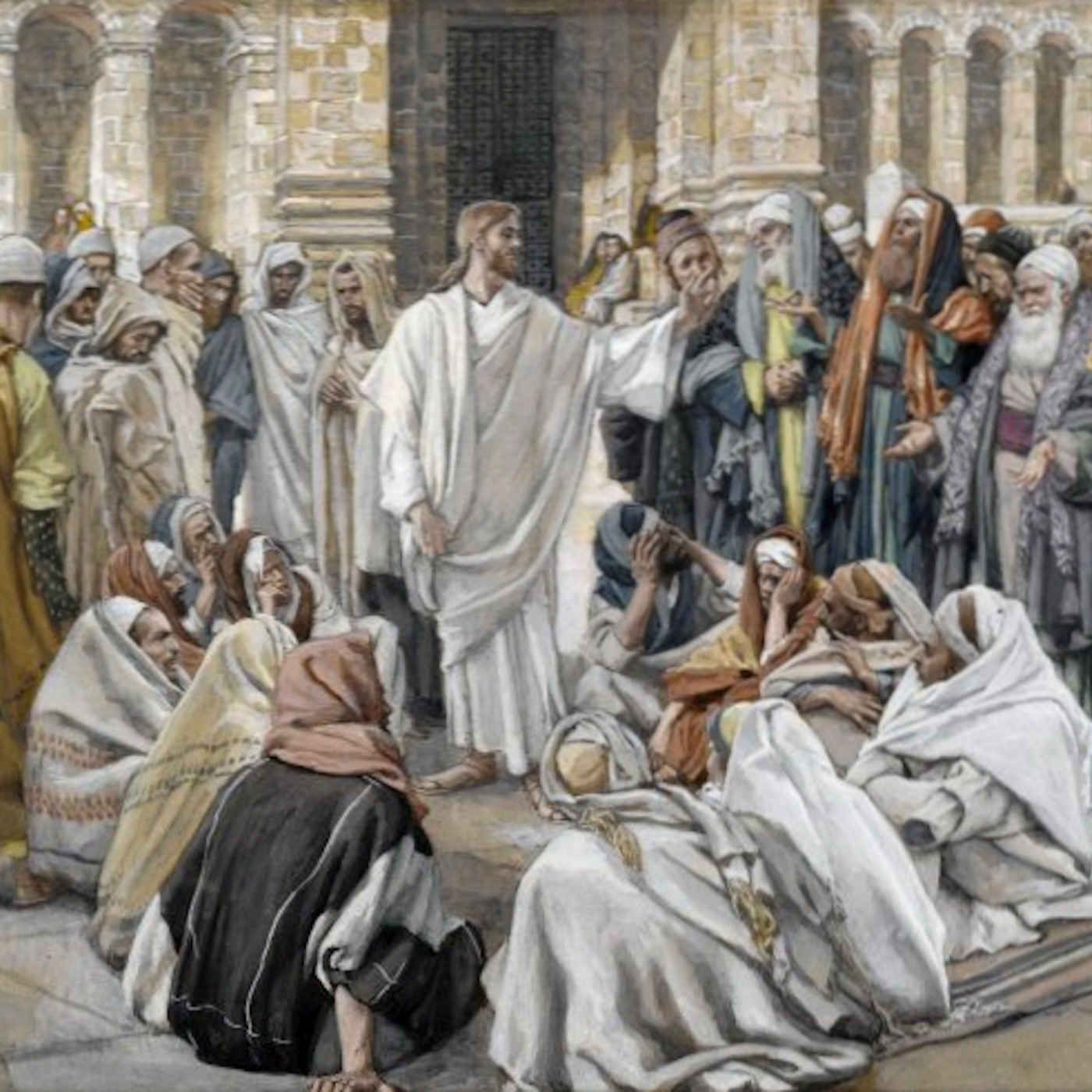

Jesus said to them, “Amen, amen, I say to you, before Abraham came to be, I AM.” So they picked up stones to throw at him; but Jesus hid and went out of the temple area. John 8:58–59 When Moses encountered God in the burning bush, God revealed His name: I AM. The teaches that this revelation of God’s name “is at once a name revealed and something like the refusal of a name.” It expresses that God is “infinitely above everything that we can understand or say.” He is the “hidden God.” He is also a “God who makes himself close to men” at each and every moment of our lives (See #206). In our Gospel today, Jesus identifies Himself with this hidden God. He states that He alone knows His Father and that the Father glorifies Him because He is the great I AM. To the people of that time, this was a shocking revelation, at least to those who failed to comprehend this truth in faith. But that mysterious name reveals to us not only the essence of God, it also reveals how we ought to relate to this infinite, hidden, exalted and glorious God. As Jesus revealed His identity, He did not say, “before Abraham came to be, I was.” He says, “I AM.” This reveals that Jesus not only existed before Abraham, but that His existence transcends all time. He always and everywhere IS. Though this might seem overly philosophical to some, it is an important concept to understand for two important reasons. First, it gives us greater insight into God. But, second, it reveals to us how we ought to relate to God every day. God is not a God of the past. He is not a God of the future. He is a God of the present moment. If we are to enter into a relationship with God, then we must realize that we can only encounter Him in the present moment. He is the Here and Now, so to speak. And we must seek Him here and now, in this present moment alone. Sometimes we find ourselves dwelling on the past. To the extent that our past has helped or hurt us in this present moment, we need to address it. But the way this is done is by seeking God’s healing grace today, allowing the past to disappear into His abundant mercy. Other times we try to live in the future, becoming anxious about what is to come. But God does not dwell in the future for, to Him, all time is here and now. Therefore, we ought not to become anxious about the future, worry about it or try to live in it now. All we have is this present moment, and it is in this moment that God comes to meet us. He is here, and we must meet Him here, turning to Him and His grace today. Reflect, today, upon this deep and mysterious revelation from our Lord. Think about his identity as the great “I AM.” Ponder that name. Ponder its meaning. See it as a way by which Jesus is inviting you to encounter Him in this present moment alone. Live in this moment. The past is gone; the future is not yet here. Live where God exists, here and now, for that is the only place that you will meet our Lord.
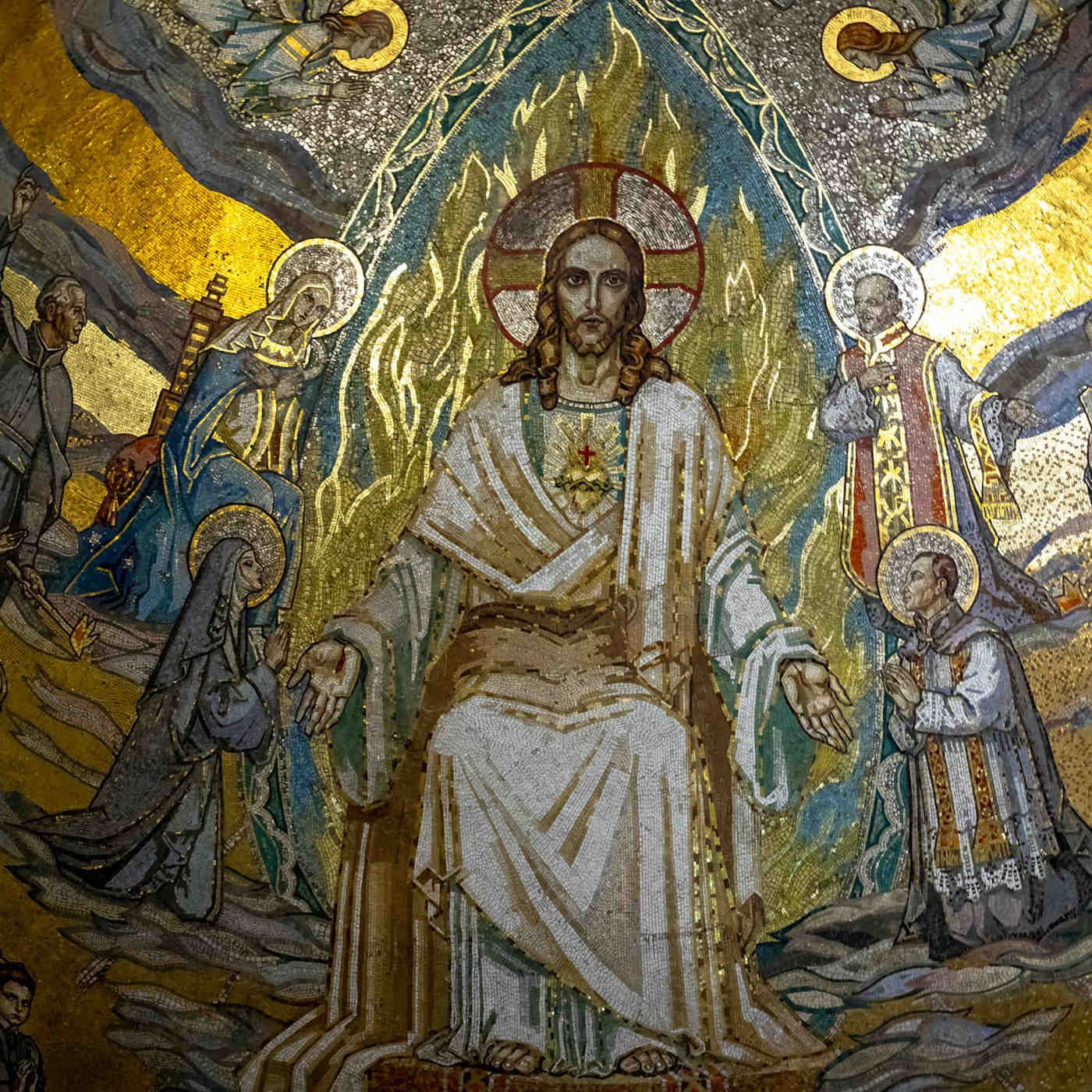

Jesus said to those Jews who believed in him, “If you remain in my word, you will truly be my disciples, and you will know the truth, and the truth will set you free.” John 8:31–32 These words have the potential to make a transforming difference in our lives. Note that Jesus spoke these words “to those Jews who believed in him.” That is, those who had accepted His word and were, therefore, His true disciples. We who also believe in Jesus should consider these words carefully. The heart of this teaching is twofold: you must come to “know the truth” so that the truth you come to know “will set you free.” This teaching of Jesus is exceptionally helpful on both a psychological and spiritual level. First of all, on a purely psychological level, one of the greatest helps to good mental health is the truth. Most often when one struggles with various forms of depression, it’s because they are seeing aspects of their life with confusion. “Why did this person do this to me?” Or “How will I ever get through this?” Or “My life is a mess and there is no way out.” These and other similar thoughts will inevitably lead to depression for one simple reason: they are based on erroneous thinking. One of the best forms of psychological counseling is what could be called “truth therapy.” Every despairing question that we have and every depressing conclusion that we have come to in life must be reexamined in the light of the mind of God. What does God think? What is in the mind of God in this regard? Those truths that are waiting to be discovered are the truth that “will set you free.” Depression is more easily overcome when we look at our life in the way that God looks at our life. This produces hope, and hope brings freedom to the chains of depression and confusion. On a spiritual level, these principles apply all the more. The truth about sin, forgiveness, salvation and Heaven must be known deeply and embraced fully. When we deny the truth of sin or forgiveness, then we live within a lie and we remain bound by that lie. True spiritual freedom that leads to salvation and eternity in Heaven is obtained only when we wholeheartedly embrace the holy and perfect spiritual truth given to us by God. We must clearly know our sin, repent of it, seek the forgiveness of God, amend our lives and live the new life of grace to which we are called. Reflect, today, upon this powerfully transforming teaching of Jesus: “know the truth, and the truth will set you free.” What psychological and spiritual truths do you need to more deeply know? What confusion or blindness remains? Seek the remedy of the Truth as it is in the mind of God and know that freedom awaits.
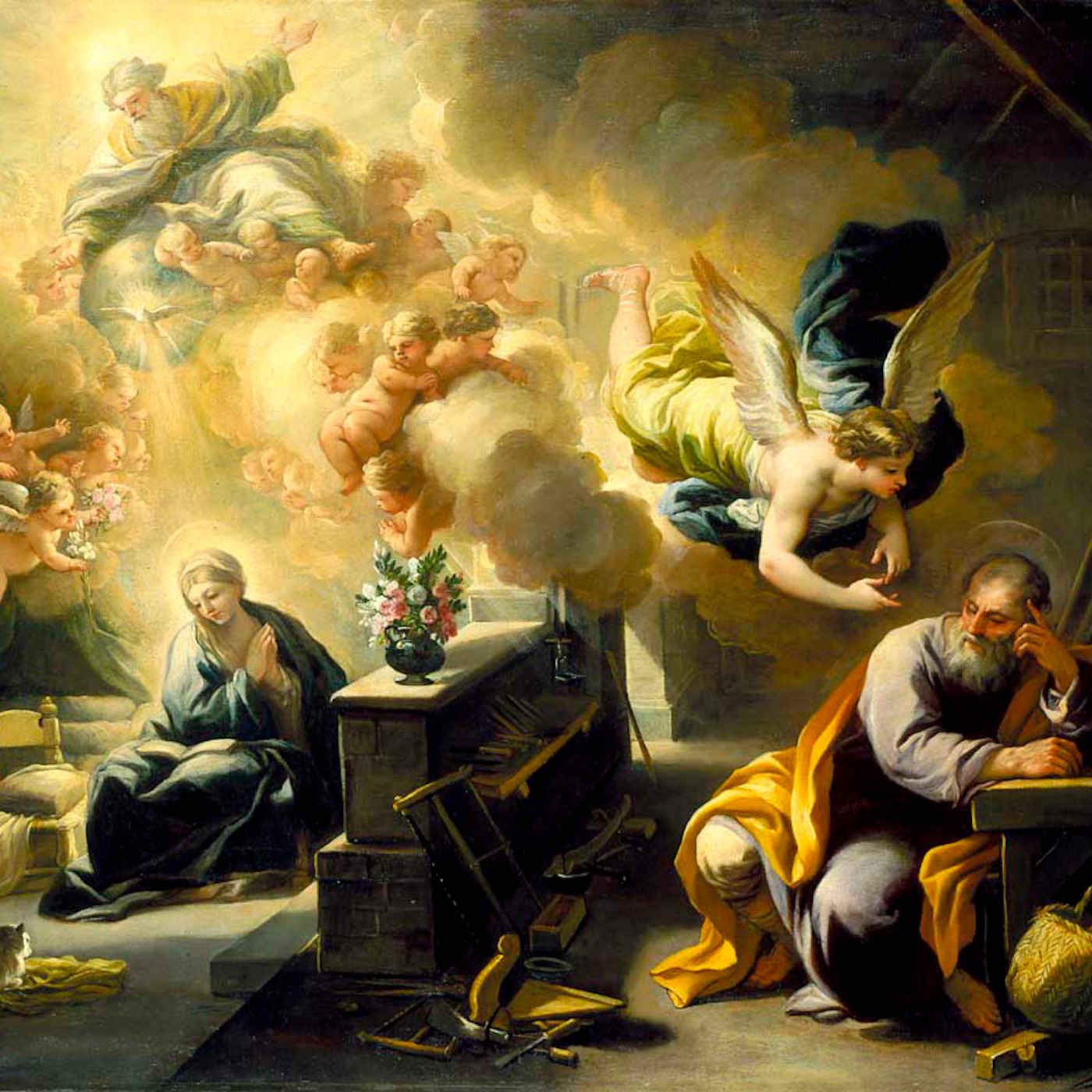

When Joseph awoke, he did as the angel of the Lord had commanded him and took his wife into his home. Matthew 1:24 What is it that made Saint Joseph so great? He wasn’t immaculately conceived as our Blessed Mother was. He was not divine like Jesus. But he was the head of the Holy Family, its guardian and its provider. He became the legal father of the Savior of the World and the spouse of the Mother of God. But Joseph is not great only because he was given such incredible privileges. First and foremost, he was great because of the choices he made in life. Today’s Gospel refers to him as a “righteous man” and as a man who “did as the angel of the Lord commanded him.” Thus, his greatness is primarily on account of his moral righteousness and obedience to the will of God. Joseph’s obedience is especially seen in the fact that he obeyed the voice of God given to him in the four dreams recorded in Scripture. In his first dream, Joseph is told “do not be afraid to take Mary your wife into your home. For it is through the Holy Spirit that this child has been conceived in her. She will bear a son and you are to name him Jesus, because he will save his people from their sins” (Matthew 1:20–21). In his second dream, Joseph is told, “Rise, take the child and his mother, flee to Egypt, and stay there until I tell you. Herod is going to search for the child to destroy him” (Matthew 2:13). In his third dream, Joseph is told, “Rise, take the child and his mother and go to the land of Israel, for those who sought the child’s life are dead” (Matthew 2:20). And in his fourth dream, Joseph is warned to go instead to Galilee rather than Judea (Matthew 2:22). When these dreams are read in succession, it is clear that Saint Joseph was attentive to the voice of God. We all have dreams, but Joseph’s dreams were different. They were clear communications from God, and they required a willing recipient. Joseph was open to the voice of God and listened in faith as that willing recipient. Joseph also responded with complete submission and full determination. The commands Joseph received were not insignificant. His obedience required that he and his family travel great distances, take up residence in strange lands and do so all in faith. It’s also clear that Joseph took his vocation seriously. Pope Saint John Paul II gave him the title “Guardian of the Redeemer.” Over and over, he showed his unwavering commitment to his role as the guardian of his legal Son, Jesus, and of his wife, Mary. His life was spent providing for them, protecting them and offering them a father’s heart. Reflect, today, upon the unique vocation of Saint Joseph. Ponder, especially, the early years of his marriage and the raising of Jesus. Consider his fatherly commitment to care for, provide for and protect his Son. We all must seek to imitate Saint Joseph’s virtues by protecting the presence of Christ within our own hearts, the hearts of our family and friends and in the world as a whole. Pray to Saint Joseph, asking him to help you follow his example so that the hidden presence of our Lord in our lives will grow and come to full maturation. (Prayer from https://mycatholic.life/year-of-saint-joseph/patris-corde-with-a-fathers-heart/) SOURCE OF CONTENT: CATHOLIC-DAILY-REFLECTIONS.COM http://catholic-daily-reflections.com/ COPYRIGHT © 2024 MY CATHOLIC LIFE! INC. ALL RIGHTS RESERVED. USED WITH PERMISSION VIA RSS FEED. FEATURED IMAGE ABOVE: HE DREAM OF ST. JOSEPH BY LUCA GIORDANO, VIA WIKIMEDIA COMMONS https://commons.wikimedia.org/wiki/File:Luca_Giordano_-_The_Dream_of_St._Joseph_-_77.52_-_Indianapolis_Museum_of_Art.jpg
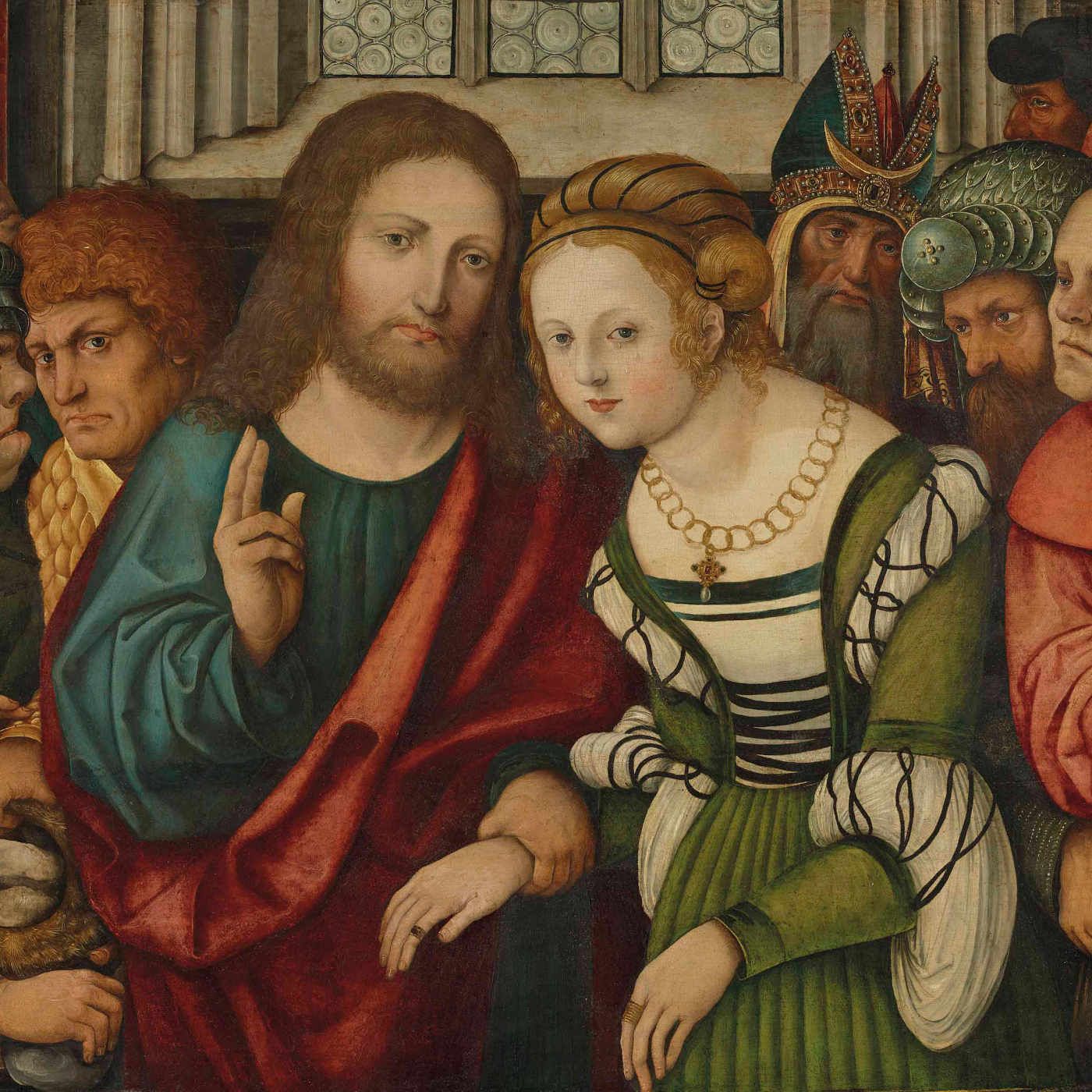

“Let the one among you who is without sin be the first to throw a stone at her.” John 8:7 This is a powerful line spoken by Jesus. The judgmental and condemning Pharisees brought a woman to Jesus who had apparently been caught “in the very act of committing adultery.” Was she a sinner? Yes, indeed she was. But this story is not so much about whether or not she was a sinner. It was about the attitude Jesus had toward sinners as compared to that held by the self-righteous, judgmental and condemning Pharisees. First of all, let’s look at this woman. She was humiliated. She had committed sin, was caught, and was publicly presented to all as a sinner. How did she react? She didn’t resist. She didn’t remain in denial. She didn’t get angry. She didn’t fight back. Instead, she stood there humiliated, awaiting her punishment with a sorrowful heart. Humiliation over one’s sins is a powerful experience that has the potential to bring forth true repentance. When we encounter someone who has sinned in a manifest way and is humiliated over their sin, we must treat them with compassion. Why? Because the dignity of the person always supersedes their sin. Every person is made in the image and likeness of God, and every person deserves our compassion. If one is obstinate and refuses to see their sin (such as in the case of the Pharisees), then an act of holy rebuke is necessary to help them repent. But when one experiences sorrow and, in this case, the added experience of humiliation, then they are ready for compassion. By stating “Let the one among you who is without sin be the first to throw a stone at her,” Jesus is not justifying her sin. Rather, He’s making it clear that no one holds the right of condemnation. No one. Not even the religious leaders. This is a hard teaching to live for many in our world today. It is commonplace for the headlines in the media to almost compulsively present us with the most sensational sins of others. We are constantly being tempted to be outraged at what this or that person has done. We easily shake our heads, condemn them and treat them as if they were dirt. In fact, it seems that many people today see it as their duty to act as the “watchdogs” against every sin they can dig up on others. Reflect, today, upon whether you are more like the Pharisees or Jesus. Would you have stood there in the crowd wanting this humiliated woman to be stoned? How about today? When you hear about the manifest sins of others, do you find yourself condemning them? Or do you hope that mercy is shown to them? Seek to imitate the compassionate heart of our divine Lord; and when your time of judgment comes, you also will be shown an abundance of compassion.
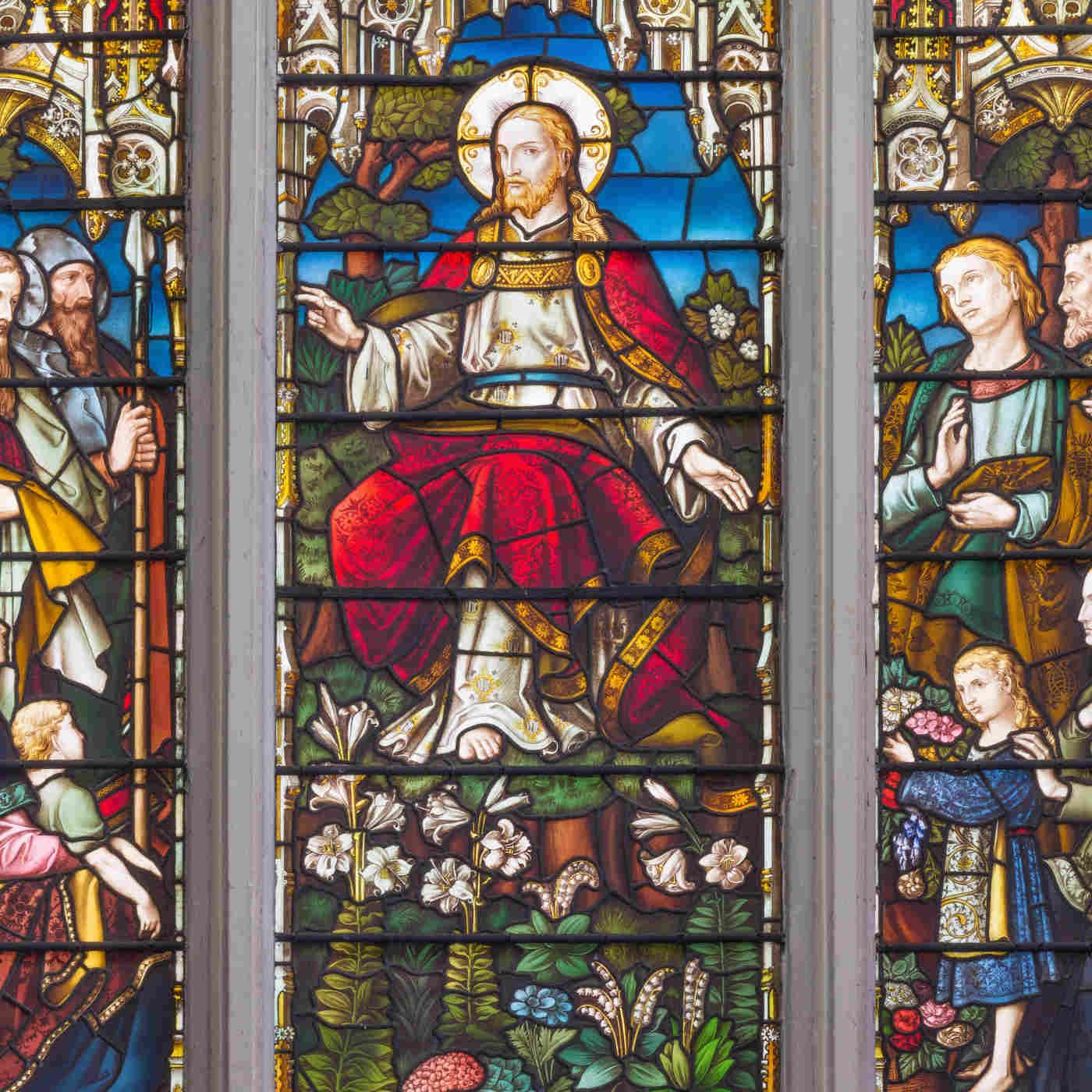

“I am troubled now. Yet what should I say? ‘Father, save me from this hour’? But it was for this purpose that I came to this hour. Father, glorify your name.” Then a voice came from heaven, “I have glorified it and will glorify it again.” John 12:27–28 Our Lord’s human soul was “troubled.” Other translations state that His soul was in agony. After expressing His interior suffering, Jesus identified the human temptation caused by this suffering: to flee from His “hour.” Of course Jesus dismisses this temptation as a way of teaching us a lesson from His human experience. As God, Jesus had perfect strength and always remained faithful to the mission He received from the Father. But as a human, Jesus permitted Himself to experience temptation and human suffering for many reasons. One reason was so that He could relate to us in every way. That includes being able to relate to interior human suffering. In doing so, Jesus also made it possible for us to imitate Him and to share in the strength and determination He had as He perfectly fulfilled the will of the Father. Jesus allowed Himself to endure the agony caused by foreseen suffering because we will endure similar temptations through life. What is it that causes you fear and anxiety as you look into the future? If there is something that immediately comes to mind, try to look at that within the light of Jesus’ own experience above. The first thing Jesus does is identify the temptation to fear. He does this by identifying the interior suffering He experiences and then by looking at the cause: His coming “hour.” The “hour” of Jesus in the Gospel of John is a reference to His crucifixion and death. This was the reason He came to us. He came to suffer the consequences of our sins and to destroy death itself. But this mission of His was the cause of true human suffering and was also a temptation toward fear. But it was a fear that He perfectly overcame. As you look at anything that tempts you to give into fear and anxiety, first ask yourself whether it is the will of God that you fulfill that action. If we are fearful of something that is not the will of the Father, then we should reject it. But very often the plan God has for our lives will include acting with courage in the face of some pending cross and suffering. Experiencing fear is normal, but fear will not turn into anxiety if we imitate our Lord and choose the will of God no matter the cost. Jesus also embraced His Cross by looking at it through the lens of glory. He understood that His suffering and death would glorify the Father in Heaven. Therefore, He allowed Himself to see the Cross as a glorification of the Father. The same must happen in our lives. No matter what we face in life, no matter the cross we are given, if it is the will of God that we embrace it, then we must see it not only as a suffering we must endure but primarily as an act by which God will be glorified in our lives. This truer perspective will bring with it hope, joy and strength which will free us from anxiety caused by fear. Reflect, today, upon the ways in which God is calling you to the cross. As you do, don’t allow fear to deter you. Instead, look at every pending suffering as an opportunity to glorify God in your life. See your crosses with gratitude and joy, and allow this new perspective to give you the strength you need to fulfill the mission given to you by the Father in Heaven. SOURCE OF CONTENT: CATHOLIC-DAILY-REFLECTIONS.COM http://catholic-daily-reflections.com/ COPYRIGHT © 2024 MY CATHOLIC LIFE! INC. ALL RIGHTS RESERVED. USED WITH PERMISSION VIA RSS FEED. FEATURED IMAGES ABOVE: THE TEACHING OF JESUS ON THE STAINED GLASS IN THE CHURCH ST. CATHARINE CREE FROM 19. CENT., VIA ADOBE https://stock.adobe.com/images/london-great-britain-september-14-2017-the-teaching-of-jesus-on-the-stained-glass-in-the-church-st-catharine-cree-from-19-cent/176284188?prev_url=detail&asset_id=176284188
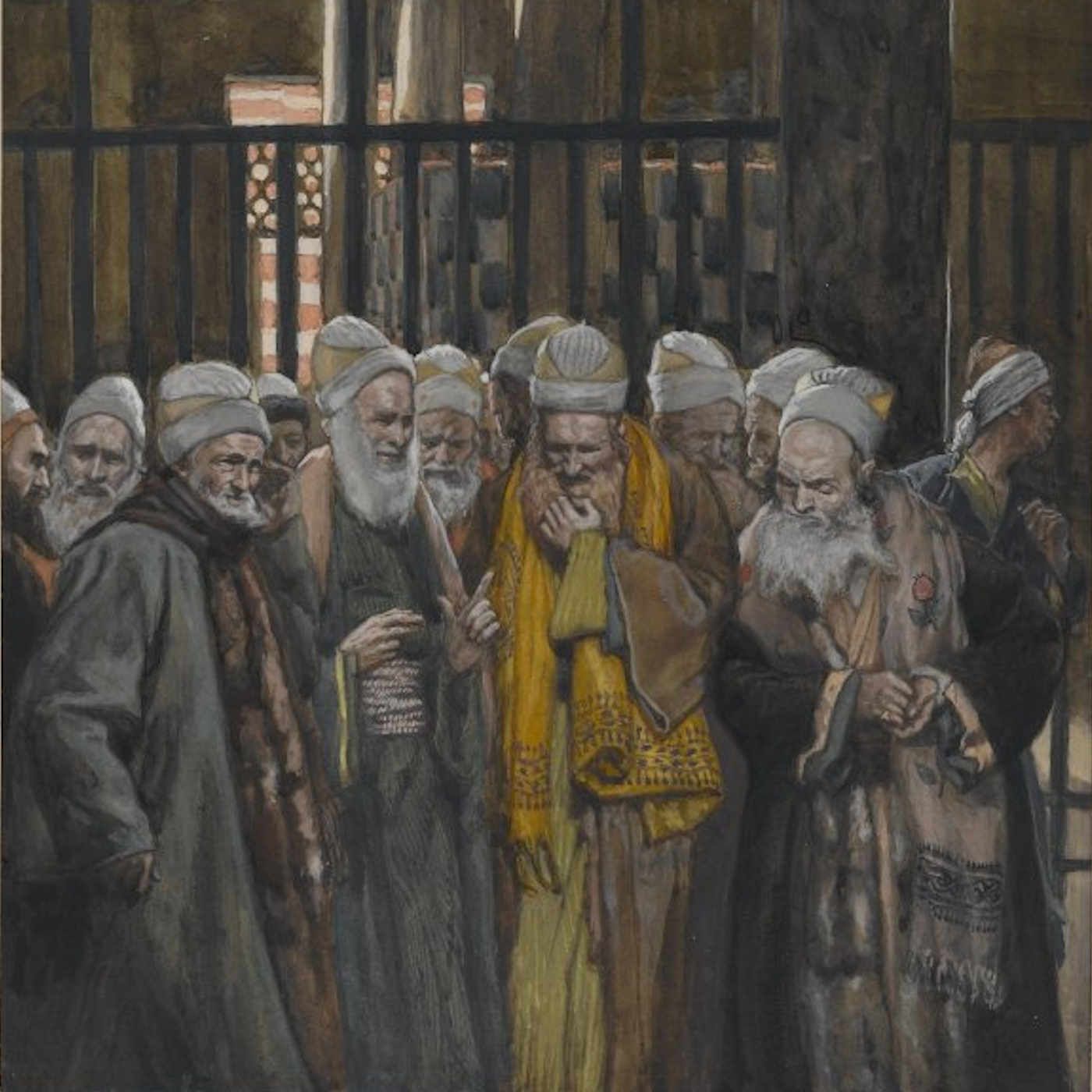

The guards answered, “Never before has anyone spoken like this man.” So the Pharisees answered them, “Have you also been deceived? Have any of the authorities or the Pharisees believed in him? But this crowd, which does not know the law, is accursed.” John 7:46–49 Hopefully the Pharisees mentioned above went through a deep interior conversion before they died. If they did not, then their day of particular judgment would have been shocking and frightening to them. The greatest act of love ever known was God becoming one of us, being conceived by the Holy Spirit in the womb of the Blessed Virgin Mary, growing up in the household of Saint Joseph, and eventually beginning His public ministry by which the saving truth of the Gospel was proclaimed so that all may come to know God and be saved. And it was of this act of perfect love given to us by God that the Pharisees attacked and called those who believed in it “deceived” and “accursed.” Though the Pharisees do not offer us much by way of inspiration, they do provide us with many lessons. In the passage above, the Pharisees model for us one of the most common tactics of the evil one. In his spiritual classic, , Saint Ignatius of Loyola explains that when a person is moving from a life of sin to a life of holiness, the evil one will attack in various ways. He will try to unsettle you and cause an undue anxiety about serving God, he will try to sadden you with an unexplained sorrow, put obstacles in your way of virtue causing you to feel overwhelmed and think you are too weak to live a good Christian life of virtue, and he will tempt you to lose your peace of heart by doubting God’s love or His action in your life. It seems clear that this attack by the Pharisees also has these goals. Again, though this may not appear “inspiring,” it is very useful to understand. The Pharisees were vicious in their attacks, not only to Jesus but also upon anyone who began to believe in Jesus. They said to the guards who were impressed by Jesus, “Have you also been deceived?” This was clearly the evil one at work through them trying to intimidate the guards and anyone who dared believe in Jesus. But understanding the tactics of the evil one and his messengers is of great value, because it helps us reject the lies and deceptions spewed out at us. Sometimes these lies come from individuals and are directed directly at us, and sometimes the lies are more universal, coming through the media, the culture and even the government, at times. Reflect, today, upon the distasteful and bitter words of these Pharisees. But do so to help yourself understand the tactics the evil one often takes as you seek greater holiness in life. Be assured that the closer you get to God, the more you will be attacked. But do not be afraid. Identify any personal, social, cultural or even governmental attack for what it is. Have confidence and do not be deterred as you seek to follow Christ more completely every day. SOURCE OF CONTENT: CATHOLIC-DAILY-REFLECTIONS.COM http://catholic-daily-reflections.com/ COPYRIGHT © 2024 MY CATHOLIC LIFE! INC. ALL RIGHTS RESERVED. USED WITH PERMISSION VIA RSS FEED. FEATURED IMAGES ABOVE: CONSPIRACY OF THE JEWS BY JAMES TISSOT, VIA WIKIMEDIA COMMONS https://commons.wikimedia.org/wiki/File:Brooklyn_Museum_-_Conspiracy_of_the_Jews_(Conspiration_des_juifs)_-_James_Tissot.jpg
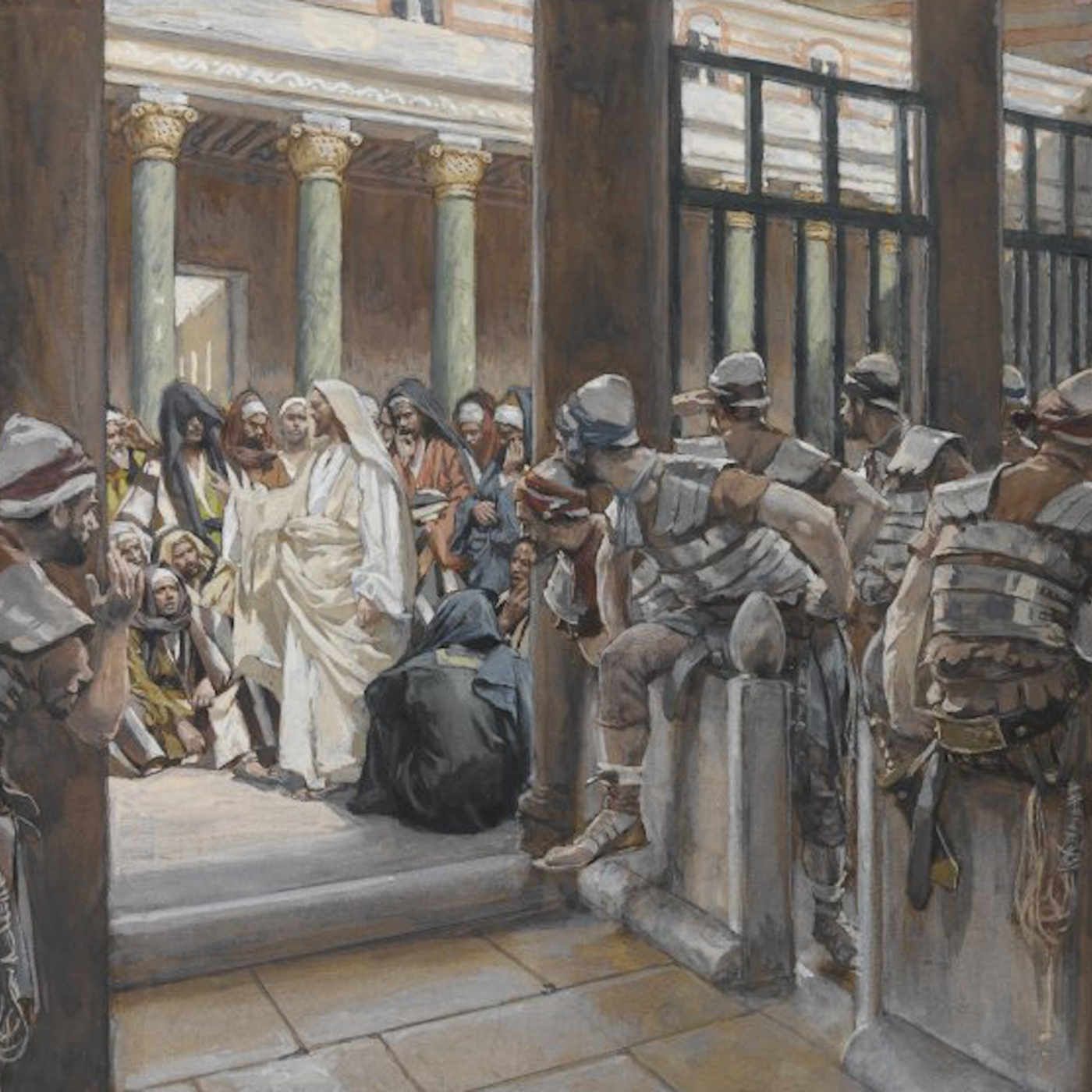

Jesus moved about within Galilee; he did not wish to travel in Judea, because the Jews were trying to kill him. But the Jewish feast of Tabernacles was near. But when his brothers had gone up to the feast, he himself also went up, not openly but as it were in secret. John 7:1–2; 10 The Jewish Feast of Tabernacles was one of three great feasts during which the people made a pilgrimage to the Temple in Jerusalem to commemorate God’s saving action in their lives. This particular feast was to commemorate the 40 years that the Israelites traveled through the desert and dwelt in tents, or booths, as they wandered and were led by Moses. Therefore, the feast is also referred to as the “Feast of Booths.” During the seven days of this feast, people would set up tents (booths) around the Temple area and live in them to commemorate the journey of their ancestors. In the Gospel passage quoted above, we read that Jesus went up to the feast secretly. Saint Augustine explains that this means that though Jesus was present, the full revelation of His divine identity was hidden from many. He was physically there, but many did not know Who He was. That particular year, when the feast was half over, Jesus appeared in the Temple area and began to teach. Many were amazed at His words, and others thought He was possessed. After teaching the people, there was much disagreement among them about our Lord's identity. Jesus said to them, “You know me and also know where I am from. Yet I did not come on my own, but the one who sent me, whom you do not know, is true. I know him, because I am from him, and he sent me.” In that statement, Jesus essentially was saying that among those listening to Him, some had come to faith in Him and discovered His true identity as the Messiah, while others lacked the gift of faith and remained blind to Him. To them, His divine essence remained a secret. In a symbolic way, Jesus’ presence at the Feast of Tabernacles reveals Him as the new Moses. It was Moses who led the people through the desert for 40 years toward the promised land while they dwelt in tents. Our Lord now took on that role of leading the people who were commemorating this 40-year journey by appearing in the Temple and pointing the people to Heaven, the true Promised Land. Today, our Lord continues to lead His people through the journey of life by coming to each of us to teach us and to reveal His divine presence. Some listen and believe and continue on the journey. To them, the secrets of our Lord are revealed. Others do not believe and, as a result of their lack of faith, fail to discover the hidden presence of our Lord all around them. Reflect, today, upon the image of Jesus coming to you during your long journey through the desert of this life. He initially comes to you in secret, veiled in His true essence. As He teaches you, He desires to lift that veil and reveal to You His true glory. He desires that you dwell with Him through prayer and remain attentive to His Word. As you gaze upon our Lord, reflect upon the question of how clearly you hear Him speak each day. He is here, with you always. But are you with Him? Do you hear Him, believe in Him, follow Him and serve Him? Do you allow Him to lead you every day toward His promises of new life? Allow our Lord to pitch His tent next to yours so that You will daily be attentive to His teaching and be led by Him to the glories of Heaven. SOURCE OF CONTENT: CATHOLIC-DAILY-REFLECTIONS.COM http://catholic-daily-reflections.com/ COPYRIGHT © 2024 MY CATHOLIC LIFE! INC. ALL RIGHTS RESERVED. USED WITH PERMISSION VIA RSS FEED. FEATURED IMAGES ABOVE: BUT NO MAN LAID HANDS UPON HIM BY JAMES TISSOT, VIA WIKIMEDIA COMMONS https://commons.wikimedia.org/wiki/File:Brooklyn_Museum_-_But_No_Man_Laid_Hands_Upon_Him_%28Les_satellites_ne_prirent_point_J%C3%A9sus%29_-_James_Tissot.jpg
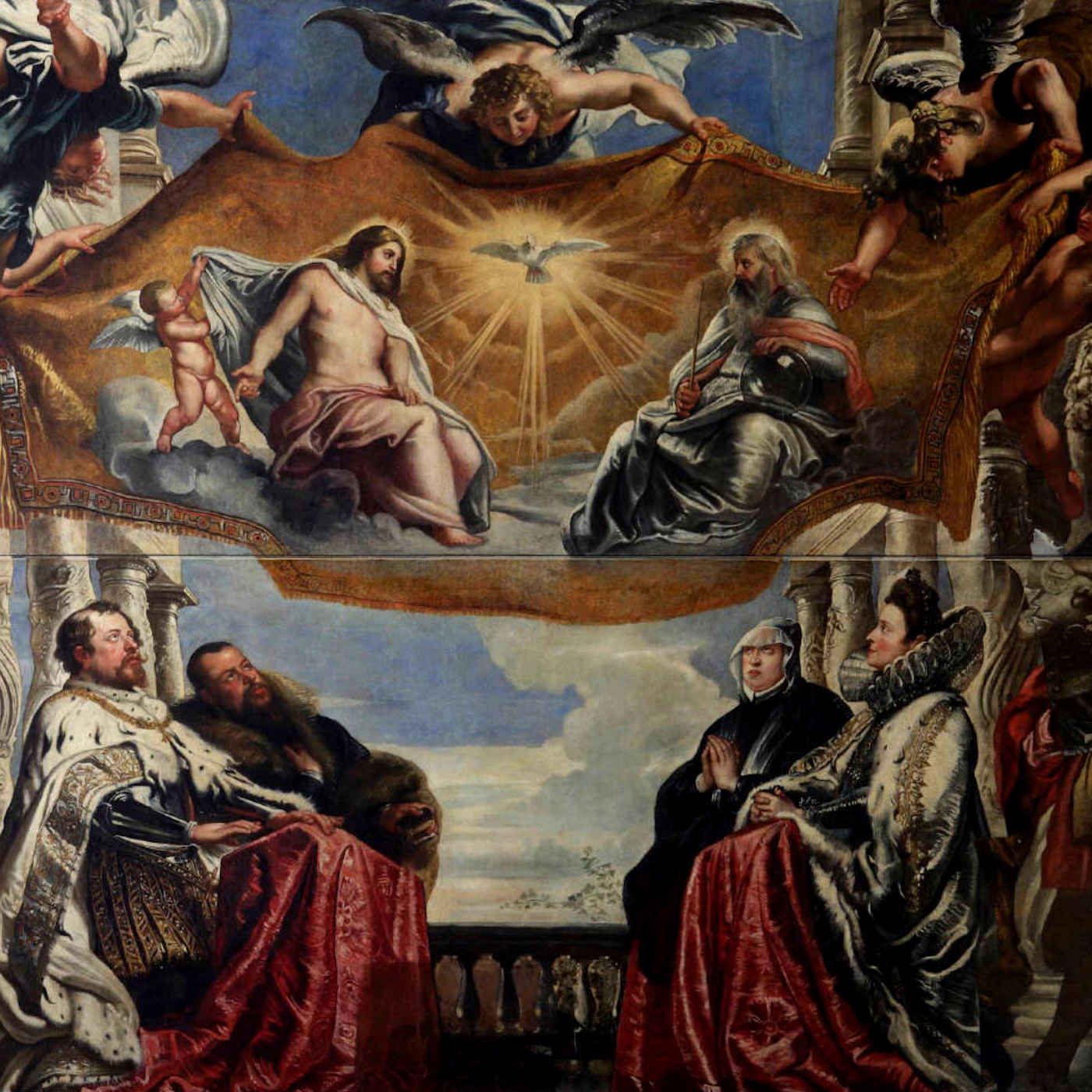

“How can you believe, when you accept praise from one another and do not seek the praise that comes from the only God?” John 5:44 It’s quite normal and healthy for a parent to praise a young child for the good that they do. This healthy positive reinforcement is a way of teaching them the importance of doing good and avoiding what’s wrong. But human praise is not an infallible guide of what is right and wrong. In fact, when human praise is not based in the truth of God, it does great damage. This short Scripture quote above comes from a lengthy teaching from Jesus about the difference between human praise and “the praise that comes only from God.” Jesus makes it clear that the only thing that has value is the praise that comes from God alone. In fact, earlier in this Gospel, Jesus says clearly, “I do not accept human praise…” Why is that? Turning back to the example of a parent praising a child for the good they do, when the praise they offer is truly a praise of their goodness, then this is much more than human praise. It is praise from God given through a parent. A parent’s duty must be to teach right from wrong in accord with the will of God. As for the “human praise” of which Jesus speaks, this is clearly praise of another that is void of the truthfulness of God. In other words, Jesus is saying that if someone were to praise Him for something that did not originate from the Father in Heaven, He would reject it. For example, if someone were to say of Jesus, “I think He would be a great governor of our nation because he could lead a revolt against the current leadership.” Obviously such “praise” would be rejected. The bottom line is that we must praise one another, but our praise must only be that which originates from God. Our words must be spoken only in accord with the Truth. Our admiration must only be of that which is the presence of God alive in others. Otherwise, if we praise others based on worldly or self-centered values, we only encourage them in sin. Reflect, today, upon the praise you give and receive. Do you allow misguided praise of others to misdirect you in life? And when you compliment and praise another, is that praise based on the Truth of God and directed to His glory? Seek to give and receive praise only when it is grounded in the Truth of God and directs all to His glory. SOURCE OF CONTENT: CATHOLIC-DAILY-REFLECTIONS.COM http://catholic-daily-reflections.com/ COPYRIGHT © 2024 MY CATHOLIC LIFE! INC. ALL RIGHTS RESERVED. USED WITH PERMISSION VIA RSS FEED. FEATURED IMAGE ABOVE: https://commons.wikimedia.org/wiki/File:Peter_Paul_Rubens_-_The_Gonzaga_Family_Worshipping_the_Holy_Trinity_-_WGA20179.jpg


“Amen, amen, I say to you, the Son cannot do anything on his own, but only what he sees the Father doing; for what he does, the Son will do also. For the Father loves the Son and shows him everything that he himself does, and he will show him greater works than these, so that you may be amazed.” John 5:25–26 The most central and most glorious mystery of our faith is that of the Most Holy Trinity. God the Father, Son and Holy Spirit are one God yet three distinct Persons. As divine “Persons,” each one is distinct; but as one God, each Person acts in perfect union with the others. In today’s Gospel, Jesus clearly identifies the Father in Heaven as His Father and clearly states that He and His Father are one. For this reason, there were those who wanted to kill Jesus because He “called God his own father, making himself equal to God.” The sad reality is that the greatest and most glorious truth of God’s inner life, the mystery of the Most Holy Trinity, was one of the primary reasons that some chose to hate Jesus and sought His life. Clearly, it was their ignorance of this glorious truth that drove them to this hatred. We call the Holy Trinity a “mystery,” not because they cannot be known but because our knowledge of Who They are can never be fully understood. For eternity, we will enter deeper and deeper into our knowledge of the Trinity and be “amazed” on a continually deepening level. One additional aspect of the mystery of the Trinity is that each one of us is called to share in Their very life. We will forever remain distinct from God; but, as many of the early Church Fathers liked to say, we must become “divinized,” meaning, we must share in God’s divine life through our union of body and soul with Christ Jesus. That union also unites us with the Father and the Spirit. This truth should also leave us “amazed,” as we read in the passage above. As we continue to read this week from the Gospel of John and continue to ponder the mysterious and profound teaching of Jesus on His relationship with the Father in Heaven, it is essential that we not simply gloss over the mysterious language Jesus uses. Rather, we must prayerfully enter the mystery and allow our penetration of this mystery to leave us truly amazed. Amazement and transforming edification is the only good response. We will never fully understand the Trinity, but we must allow the truth of our Triune God to take hold of us and enrichen us, at very least, in a way that knows how much we do not know—and that knowledge leaves us in awe. Reflect, today, upon the sacred mystery of the Most Holy Trinity. Pray that God reveals Himself more fully to your mind and more completely consume your will. Pray that you will be able to share deeply in the life of the Trinity so that you will be filled with a holy amazement and awe.
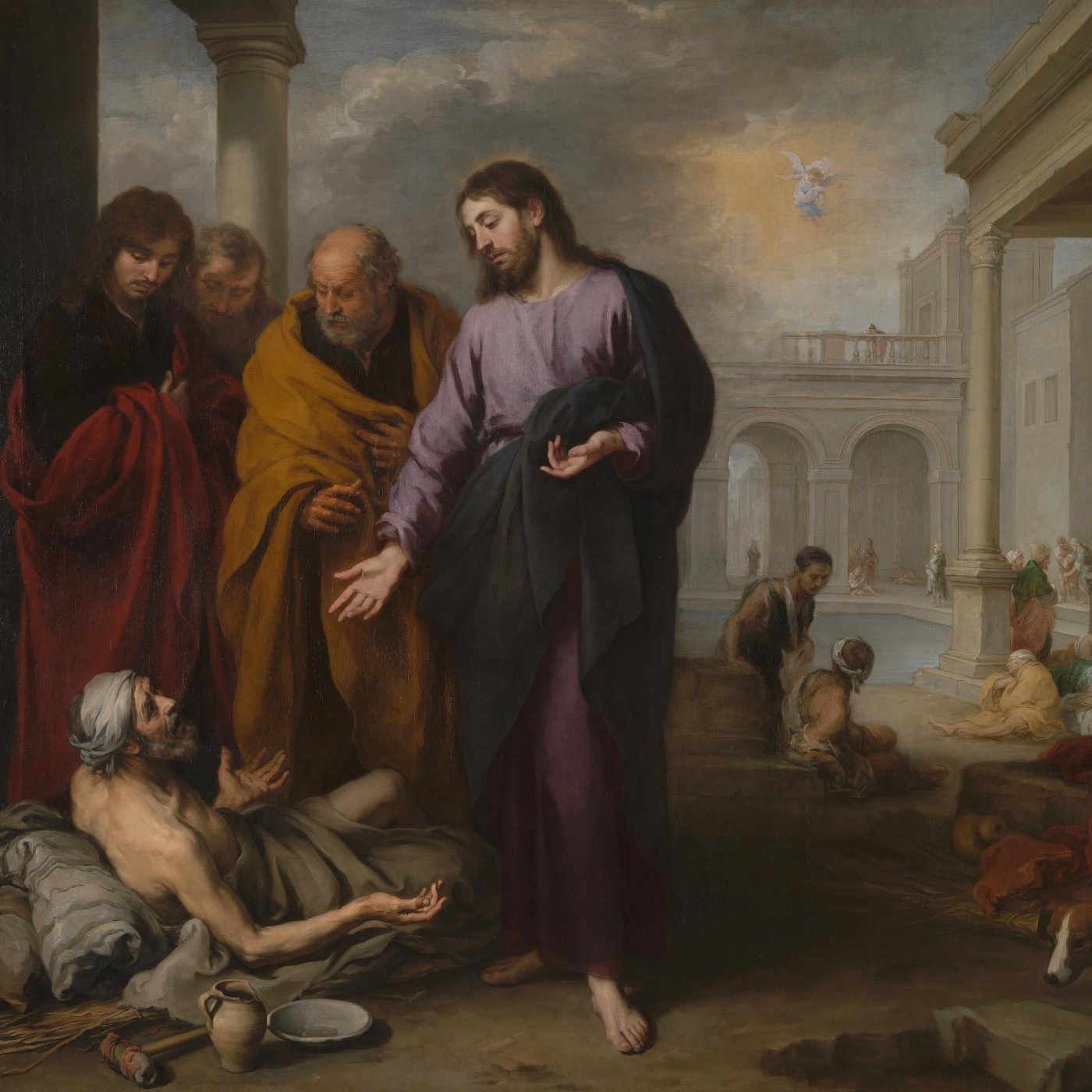

One man was there who had been ill for thirty-eight years. When Jesus saw him lying there and knew that he had been ill for a long time, he said to him, “Do you want to be well?” John 5:5–6 Only those who have been crippled for many years could understand what this man endured in life. He was crippled and unable to walk for thirty-eight years. The pool he was laying next to was believed to have the power of healing. Therefore, many who were sick and crippled would sit by the pool and try to be the first to enter it when the waters were stirred up. From time to time, that person was said to have received healing. Jesus sees this man and clearly perceives his desire for healing after so many years. Most likely, his desire for healing was the dominant desire in his life. Without the ability to walk, he could not work and provide for himself. He would have had to rely upon begging and the generosity of others. Thinking about this man, his sufferings and his ongoing attempts for healing from this pool should move any heart to compassion. And since Jesus’ heart was one that was full of compassion, He was moved to offer this man not only the healing he so deeply desired but so much more. One virtue in the heart of this man that would have especially moved Jesus to compassion is the virtue of patient endurance. This virtue is an ability to have hope in the midst of some ongoing and lengthy trial. It is also referred to as “longsuffering” or “longanimity.” Usually, when one faces a difficulty, the immediate reaction is to look for a way out. As time moves on and that difficulty is not removed, it’s easy to fall into discouragement and even despair. Patient endurance is the cure for this temptation. When one can patiently endure anything and everything they suffer in life, there is a spiritual strength within them that benefits them in numerous ways. Other little challenges are more easily endured. Hope is born within them to a powerful degree. Even joy comes with this virtue despite the ongoing struggle. When Jesus saw this virtue alive in this man, He was moved to reach out and heal him. And the primary reason Jesus healed this man was not just to help him physically but so that the man would come to believe in Jesus and follow Him. Reflect, today, upon this beautiful virtue of patient endurance. The trials of life should ideally be seen not in a negative way but as an invitation to patient endurance. Ponder the way you endure your own trials. Is it with deep and ongoing patience, hope and joy? Or is it with anger, bitterness and despair. Pray for the gift of this virtue and seek to imitate this crippled man. SOURCE OF CONTENT: CATHOLIC-DAILY-REFLECTIONS.COM http://catholic-daily-reflections.com/ COPYRIGHT © 2024 MY CATHOLIC LIFE! INC. ALL RIGHTS RESERVED. USED WITH PERMISSION VIA RSS FEED. Featured images above: , via Wikimedia Commons https://commons.wikimedia.org/wiki/File:Curacion_del_paralitico_Murillo_1670FXD.jpg
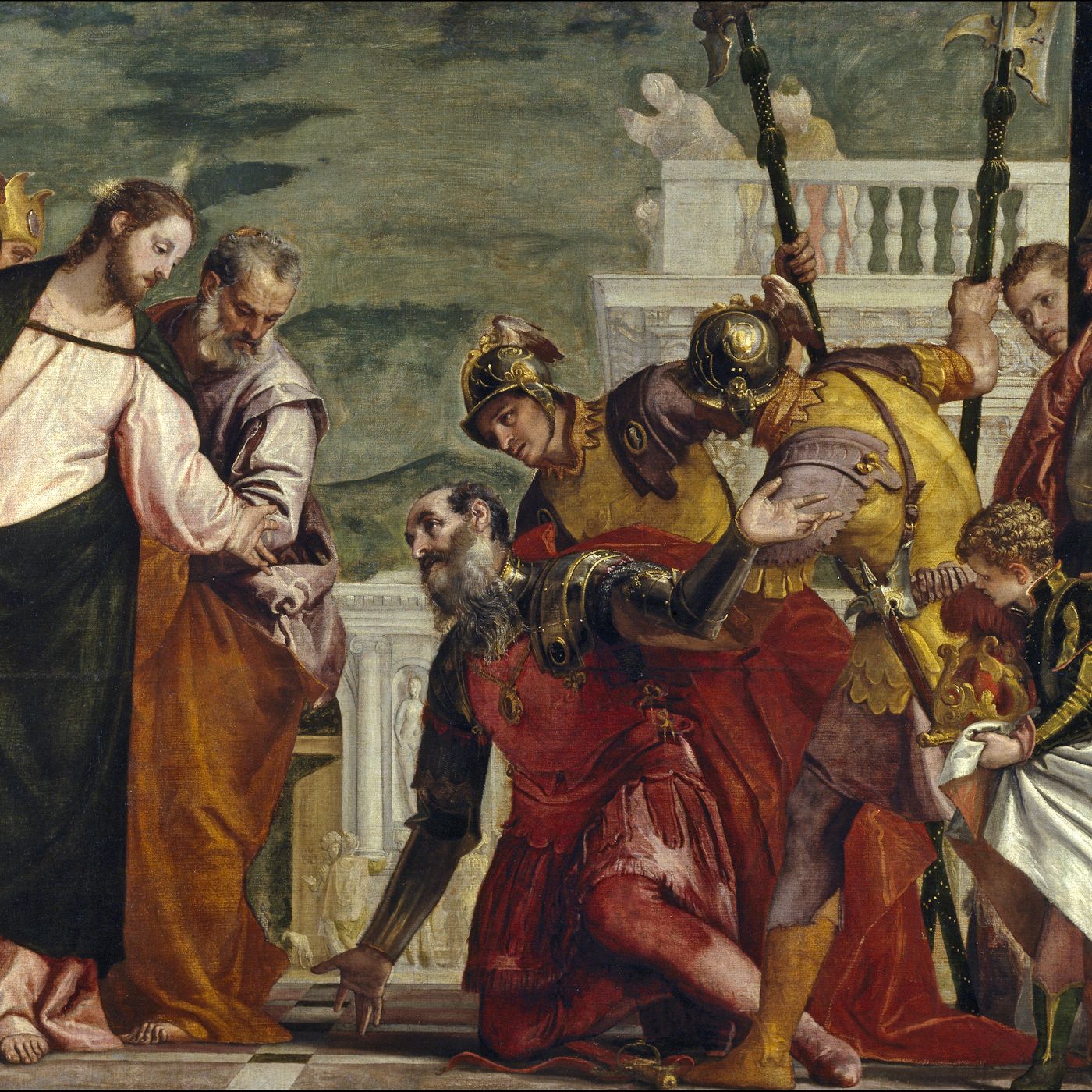

Now there was a royal official whose son was ill in Capernaum. When he heard that Jesus had arrived in Galilee from Judea, he went to him and asked him to come down and heal his son, who was near death. Jesus said to him, “Unless you people see signs and wonders, you will not believe.” John 4:46–48 Jesus did end up healing the royal official’s son. And when the royal official returned to discover his son healed, we are told that “he and his whole household came to believe.” Some came to believe in Jesus only after He performed miracles. There are two lessons we should take from this. First of all, the fact that Jesus performed miracles is a testimony to Who He is. He is a God of abundant mercy. As God, Jesus could have expected faith from those to whom He ministered without offering them the “proof” of signs and wonders. This is because true faith is not based upon external evidence, such as seeing miracles; rather, authentic faith is based upon an interior revelation from God by which He communicates His very self to us and we believe. Therefore, the fact that Jesus did signs and wonders shows just how merciful He is. He offered these miracles, not because anyone deserved them but simply because of His abundant generosity to help spark faith in the lives of those who found it hard to believe through the interior gift of faith alone. With that said, it’s important to understand that we should work to develop our faith without relying upon external signs. Imagine, for example, if Jesus would have never performed any miracles. How many would have come to believe in Him? Perhaps very few. But there would have been some who came to believe, and those who did would have had a faith that was exceptionally deep and authentic. Imagine, for example, if this royal official did not receive a miracle for his son but, nonetheless, chose to believe in Jesus anyway through the transforming interior gift of faith. In each one of our lives, it is essential that we work to develop our faith, even if God doesn’t seem to act in powerful and evident ways. In fact, the deepest form of faith is born in our lives when we choose to love God and serve Him, even when things are very difficult. Faith in the midst of difficulty is a sign of very authentic faith. Reflect, today, upon the depth of your own faith. When life is hard, do you love God and serve Him anyway? Even if He doesn’t remove the crosses you carry? Seek to have true faith at all times and in every circumstance and you will be amazed at how real and sustaining your faith becomes. SOURCE OF CONTENT: CATHOLIC-DAILY-REFLECTIONS.COM http://catholic-daily-reflections.com/ COPYRIGHT © 2024 MY CATHOLIC LIFE! INC. ALL RIGHTS RESERVED. USED WITH PERMISSION VIA RSS FEED. FEATURED IMAGES ABOVE: CHRIST AND THE CENTURION BY PAOLO VERONESE, WIKIMEDIA COMMONS https://commons.wikimedia.org/wiki/File:Jes%C3%BAs_y_el_centuri%C3%B3n_(El_Veron%C3%A9s).jpg
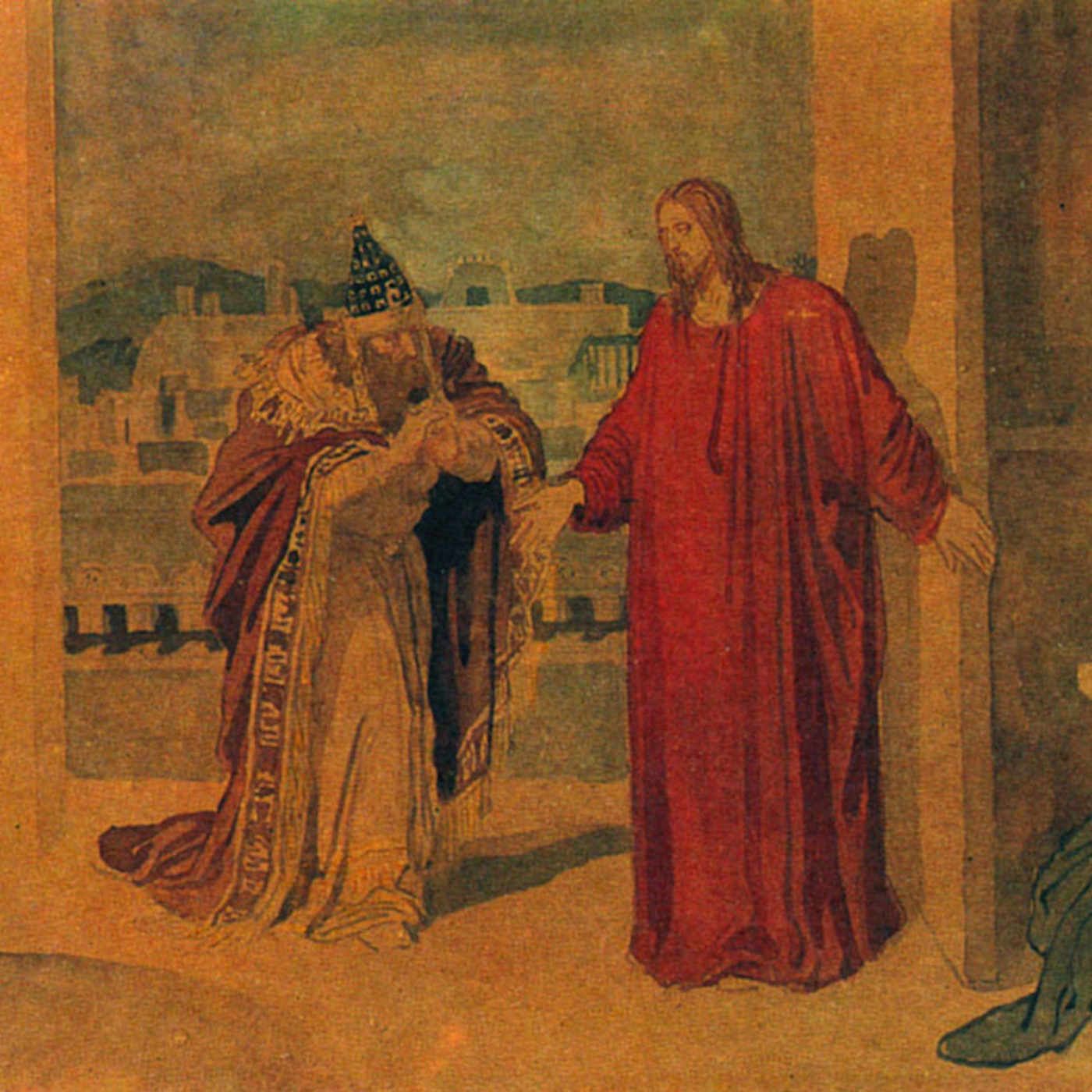

Jesus said to Nicodemus: “Just as Moses lifted up the serpent in the desert, so must the Son of Man be lifted up, so that everyone who believes in him may have eternal life.” John 3:14–15 The line quoted above concludes a dialogue that Jesus had with Nicodemus, a Pharisee and a member of the Sanhedrin. This is the first of three times Nicodemus is mentioned in the Gospel of John. The second time he appears is when he reminds the other members of the Sanhedrin that a man must be first heard before he is condemned. The third time was when Jesus was killed and Nicodemus brought a mixture of myrrh and aloes to prepare Jesus’ body for burial. Jesus was not accepted by most of the Pharisees and within the Sanhedrin. For that reason, Nicodemus was taking a risk by going to him at night to talk. But Jesus clearly senses faith in the heart of Nicodemus, which is why when Nicodemus asks Jesus about His teaching, Jesus answers him. Unlike the other Pharisees, Nicodemus was not trying to trap our Lord; he sincerely wanted to understand. At the beginning of this dialogue between Jesus and Nicodemus, Nicodemus professes the beginning of faith in Jesus when he says, “Rabbi, we know that you are a teacher who has come from God, for no one can do these signs that you are doing unless God is with him” (John 3:2). Interestingly, Jesus then speaks to Nicodemus in figures of speech, saying that one can only enter the Kingdom of God when they are “born from above” and “born from water and the Spirit.” Nicodemus tries to understand but fails. Jesus then gently rebukes him by saying, “You are the teacher of Israel and you do not understand this?” (John 3:10). Jesus then goes on to speak further in symbolic language and figures of speech, concluding with the beginning of today’s Gospel quoted above when He speaks in a veiled way about His coming crucifixion. One thing that is important to understand from this dialogue between Jesus and Nicodemus is that Jesus’ language is veiled in symbolic language because, even though Nicodemus was on the right path, he was not yet ready for the full revelation of the Gospel. He could not yet fully comprehend all that our Lord came to reveal. Thus, Jesus spoke in veiled language and invited Nicodemus to keep seeking its hidden meaning. In our own lives, we can come to God and want Him to speak clearly and definitively to us, revealing His perfect will for our lives. But often He doesn’t. Why? Because God knows we are not yet ready for the full truth. When He speaks to us and when we gain insight in one way or another, this is good and reveals we are on the right path. But the Gospel, in its fullness, is so radical and so demanding that most people are not yet ready for the full truth. Therefore, in His compassion, God gives us only what we can handle at the moment. But this humble truth should encourage us, as it did Nicodemus, not to give up and to continue opening ourselves to the fullness of the Word of God. Reflect, today, upon how open you are to the fullness of God’s Word. What would happen if God were to reveal to you, by an immediate personal revelation of divine knowledge, all that was in His sacred mind? Would it be too much for you to handle? Yes, it would be. But that humble admission is an important step toward that very goal. Humble yourself, today, more fully before the mysterious Word of God and pray that you will continue to be changed and open so that the clarity of God’s truth will more fully penetrate your soul. Featured images above: Jesus and Nikodim By Alexander Andreyevich Ivanov, via Wikipedia https://en.wikipedia.org/wiki/File:Nikodim_and_Jesus.jpeg


Jesus addressed this parable to those who were convinced of their own righteousness and despised everyone else. “Two people went up to the temple area to pray; one was a Pharisee and the other was a tax collector.” Luke 18:9–10 This Scripture passage introduces the Parable of the Pharisee and the Tax Collector. They both go to the Temple to pray, but their prayers are very different from each other. The prayer of the Pharisee is very dishonest, whereas the prayer of the tax collector is exceptionally sincere and honest. Jesus concludes by saying that the tax collector went home justified but not the Pharisee. He states, “...for everyone who exalts himself will be humbled, and the one who humbles himself will be exalted.” True humility is simply being honest. Too often in life we are not honest with ourselves and, therefore, are not honest with God. Thus, for our prayer to be true prayer, it must be honest and humble. And the humble truth for all of our lives is best expressed by the prayer of the tax collector who prayed, “O God, be merciful to me a sinner.” How easy is it for you to admit your sin? When we understand the mercy of God, this humility is much easier. God is not a God of harshness but is a God of the utmost mercy. When we understand that God’s deepest desire is to forgive us and to reconcile us to Himself, then we will deeply desire honest humility before Him. Lent is an important time for us to deeply examine our conscience and make new resolutions for the future. Doing so will bring new freedom and grace into our lives. So do not be afraid to honestly examine your conscience so as to see your sin clearly in the way God sees it. Doing so will put you in a position to pray this prayer of the tax collector: “O God, be merciful to me a sinner.” Reflect, today, upon your sin. What do you struggle with the most right now? Are there sins from your past that you have never confessed? Are there ongoing sins that you justify, ignore and are afraid to face? Take courage and know that honest humility is the road to freedom and the only way to experience justification before God. SOURCE OF CONTENT: CATHOLIC-DAILY-REFLECTIONS.COM http://catholic-daily-reflections.com/ COPYRIGHT © 2024 MY CATHOLIC LIFE! INC. ALL RIGHTS RESERVED. USED WITH PERMISSION VIA RSS FEED. FEATURED IMAGES ABOVE: THE PHARISEE AND THE PUBLICAN BY BARENT FABRITIUS, VIA WIKIMEDIA COMMONS https://commons.wikimedia.org/wiki/File:De_Farizee%C3%ABr_en_de_tollenaar_Rijksmuseum_SK-A-2959.jpeg
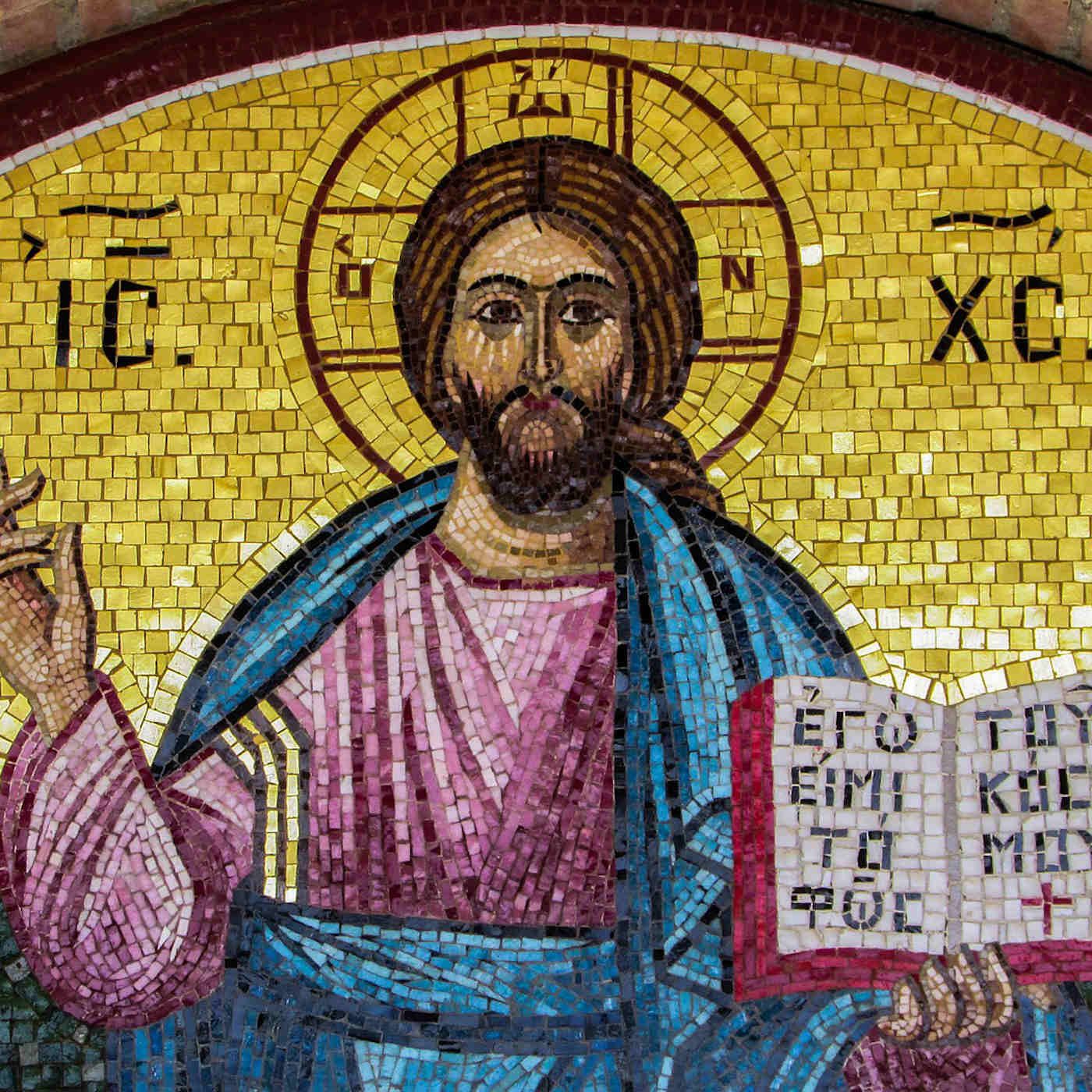

“Hear, O Israel! The Lord our God is Lord alone! You shall love the Lord your God with all your heart, with all your soul, with all your mind, and with all your strength.” Mark 12:29–30 Why would you choose anything less than to love the Lord your God with ALL your heart, with ALL your soul, with ALL your mind, and with ALL your strength? Why would you choose anything less? Of course, we do choose many other things to love in life, even though Jesus is clear with this commandment. The truth is that the only way to love others, and even to love ourselves, is to choose to love God with ALL we are. God must be the one and only focus of our love. But what’s amazing is that the more we do this, the more we realize that the love we have in our lives is the kind of love that overflows and overflows in superabundance. And it is this overflowing love of God that then pours forth on others. On the other hand, if we try to divide our loves by our own effort, giving God only part of our heart, soul, mind and strength, then the love we have for God cannot grow and overflow in the way God wants. We limit our capacity for love, and we fall into selfishness. Love of God is a truly amazing gift when it is total and all-consuming. Each one of these parts of our lives are worth pondering and examining. Think about your heart and how you are called to love God with your heart. And how does this differ from loving God with your soul? Perhaps your heart is more focused on your feelings, emotions and compassion. Perhaps your soul is more spiritual in nature. Your mind loves God the more it probes the depth of His Truth, and your strength is your passion and drive in life. Regardless of how you understand the various parts of your being, the key is that every part must love God in fullness. Reflect, today, upon the beautiful commandment of our Lord. It’s a command of love, and it is given to us not so much for God’s sake but for ours. God wants to fill us to the point of overflowing love. Why would we ever choose anything less? SOURCE OF CONTENT: CATHOLIC-DAILY-REFLECTIONS.COM http://catholic-daily-reflections.com/ COPYRIGHT © 2024 MY CATHOLIC LIFE! INC. ALL RIGHTS RESERVED. USED WITH PERMISSION VIA RSS FEED. FEATURED IMAGES ABOVE: BY DIMITRIS VETSIKAS FROM PIXABAY https://pixabay.com/es/photos/dintel-jesucristo-mosaico-iglesia-1685661/
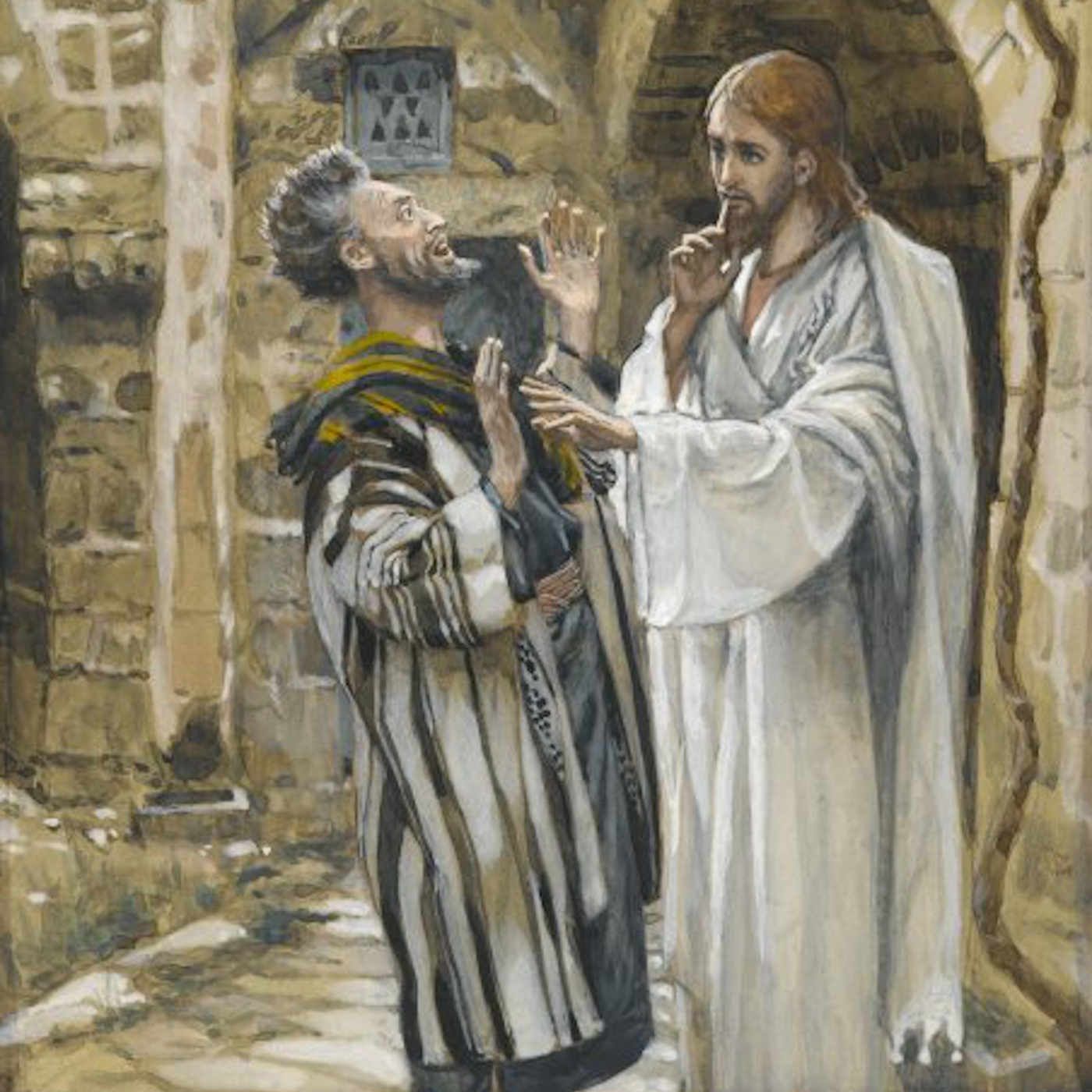

“But if it is by the finger of God that I drive out demons, then the Kingdom of God has come upon you.” Luke 11:20 The Kingdom of God can come upon us in a variety of ways. The line from today’s Gospel above comes in the middle of a story of Jesus casting out a demon from a man who was mute. Once the demon was cast out, the mute man began to speak, and all were amazed. And though some were amazed and grew in faith as a result, others turned their amazement into irrationality. The irrationality of some was that they saw what Jesus did, but they didn’t want to accept that His power was divine. Therefore, some of them said, “By the power of Beelzebul, the prince of demons, he drives out demons.” They couldn’t deny that Jesus drove out a demon, since they saw it happen with their own eyes. But they were unwilling to accept Jesus’ divinity, so they jumped to the irrational conclusion that Jesus’ act was done by the power of “the prince of demons.” This irrational stance of some people is one of the most dangerous stances one can take. It’s the stance of an obstinate heart. They were given the incredible witness of the power of God at work but refused to respond in faith to what they witnessed. For those who are obstinate, when the Kingdom of God comes upon them, as Jesus stated above, the effect is that they react in a violent, angry and irrational way. This form of reaction is exceptionally prevalent today in the secular world. Many in the secular media, for example, constantly react violently and irrationally to all that is part of the Kingdom of God. As a result, the evil one easily misleads many, causing confusion and chaos. For those who have eyes to see clearly, this violent and irrational rejection of the Kingdom of God is very clear. And for those with faith and an open heart, the pure message of the Gospel is like water to a dry and parched soul. They soak it up and find great refreshment. For them, when the Kingdom of God comes upon them, they are energized, inspired and driven with a holy passion to further God’s Kingdom. Irrationality disappears, and God’s pure Truth prevails. Reflect, today, upon your heart. Are you obstinate in any way? Are there teachings from Christ and His Church that you are tempted to reject? Is there some truth that you need to hear in your personal life to which you find it difficult to be open? Pray that the Kingdom of God come upon you today and every day and, as it does, that you will be a powerful instrument of its establishment in this world. Source of content: catholic-daily-reflections.com http://catholic-daily-reflections.com/ Copyright © 2024 My Catholic Life! Inc. All rights reserved. Used with permission via RSS feed. Featured images above: Jesus Heals a Mute Possessed Man By James Tissot, via Wikimedia Commons https://commons.wikimedia.org/wiki/File:Brooklyn_Museum_-_Jesus_Heals_a_Mute_Possessed_Man_(J%C3%A9sus_gu%C3%A9rit_un_poss%C3%A9d%C3%A9_muet)_-_James_Tissot.jpg


“I have come not to abolish but to fulfill. Amen, I say to you, until heaven and earth pass away, not the smallest letter or the smallest part of a letter will pass from the law, until all things have taken place.” Matthew 5:17–18 The Old Law, the law from the Old Testament, prescribed various moral precepts, as well as ceremonial precepts for worship. Jesus makes it clear that He is not abolishing all that God taught through Moses and the Prophets. This is because the New Testament is the culmination and completion of the Old Testament. Thus, nothing of old was abolished; it was fulfilled and brought to completion. The moral precepts of the Old Testament were laws that flowed primarily from human reason. It made sense that one should not kill, steal, commit adultery, lie, etc. It also made sense that God should be honored and respected. The Ten Commandments and the other moral laws still hold today. But Jesus brings us much further. He not only called us to go much deeper in the keeping of these commandments, He also promised the gift of grace so that they could be fulfilled. Thus, “Thou shall not kill” is deepened to the requirement of complete and total forgiveness of those who persecute us. It’s interesting to note that the new depth of the moral law Jesus gives actually goes beyond human reason. “Thou shall not kill” makes sense to almost everyone, but “love your enemies and pray for those who persecute you” is a new moral law that makes sense only by the help of grace. But without grace, the natural human mind alone cannot arrive at this new commandment. This is extremely helpful to understand, because oftentimes we go through life relying upon our human reason alone when it comes to making moral decisions. And though our human reason will always direct us away from the most obvious moral failures, it will be insufficient alone to guide us to the heights of moral perfection. Grace is necessary for this high calling to make sense. Only by grace can we understand and fulfill the call to take up our crosses and follow Christ. Reflect, today, upon your own calling to perfection. If it doesn’t make sense to you how God can expect perfection of you, then pause and reflect upon the fact that you are right—it doesn’t make sense to human reason alone! Pray that your human reason will be flooded with the light of grace so that you will be able to not only understand your high calling to perfection but that you will also be given the grace you need to achieve it.


Peter approached Jesus and asked him, “Lord, if my brother sins against me, how often must I forgive him? As many as seven times?” Jesus answered, “I say to you, not seven times but seventy-seven times.” Matthew 18:21–22 Forgiveness of another is difficult. It’s much easier to remain angry. This line quoted above is the introduction to the Parable of the Unforgiving Servant. In that parable, Jesus makes it clear that if we want to receive forgiveness from God, then we must forgive others. If we withhold forgiveness, we can be certain that God will withhold it from us. Peter may have thought that he was being quite generous in his question to Jesus. Clearly Peter had been considering Jesus’ teachings about forgiveness and was ready to take the next step of offering that forgiveness freely. But Jesus’ answer to Peter makes it clear that Peter’s concept of forgiveness greatly paled in comparison to the forgiveness demanded by our Lord. The parable that Jesus then tells presents us with a man who was forgiven a huge debt. Subsequently, when that man encountered a person who owed him a small debt, he failed to offer the same forgiveness that was given to him. As a result, the master of that man who was forgiven the huge debt becomes outraged and requires once again a full payment of the debt. And then Jesus ends the parable with a shocking statement. He says, “Then in anger his master handed him over to the torturers until he should pay back the whole debt. So will my heavenly Father do to you, unless each of you forgives your brother from your heart.” Note that the forgiveness God expects us to offer others is one that comes from the heart. And note that a lack of forgiveness on our part will result in us being handed “over to the torturers.” These are serious words. By “torturers,'' we should understand that the sin of not forgiving another brings with it much interior pain. When we hold on to anger, this act “tortures” us in a certain way. Sin always has this effect upon us, and it is for our good. It’s a way in which God constantly challenges us to change. Thus, the only way to freedom from this interior form of torture by our sin is to overcome that sin, and in this case, to overcome the sin of withholding forgiveness. Reflect, today, upon the calling God has given to you to forgive to the fullest extent. If you still sense anger in your heart toward another, keep working at it. Forgive over and over. Pray for that person. Refrain from judging them or condemning them. Forgive, forgive, forgive, and God’s abundant mercy will also be given to you. SOURCE OF CONTENT: CATHOLIC-DAILY-REFLECTIONS.COM http://catholic-daily-reflections.com/ COPYRIGHT © 2024 MY CATHOLIC LIFE! INC. ALL RIGHTS RESERVED. USED WITH PERMISSION VIA RSS FEED. FEATURED IMAGE ABOVE: CHRIST AND HIS DISCIPLES ON THEIR WAY TO EMMAUS BY PIETER COCK VAN AELST https://commons.wikimedia.org/wiki/File:Pieter_Coecke_van_Aelst_-_Christ_and_His_Disciples_on_Their_Way_to_Emmaus_-_WGA5125.jpg
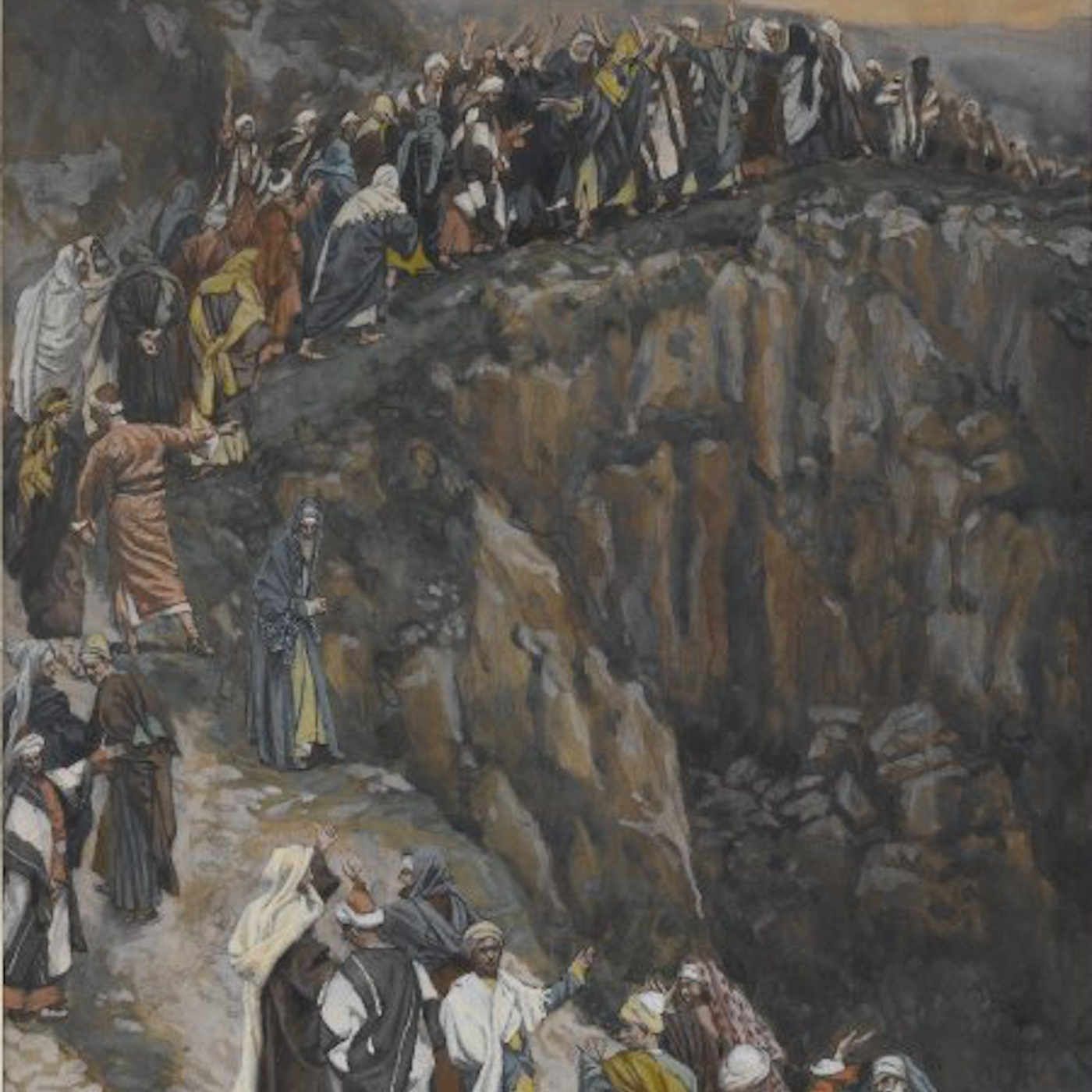

When the people in the synagogue heard this, they were all filled with fury. They rose up, drove him out of the town, and led him to the brow of the hill on which their town had been built, to hurl him down headlong. But he passed through the midst of them and went away. Luke 4:28–30 One of the first places Jesus went to begin His public ministry was His own home town. After entering the Synagogue and reading from the Prophet Isaiah, Jesus proclaimed that the prophecy of Isaiah was now fulfilled in His very person. This caused His townspeople to be outraged at Him, thinking He was blaspheming. So they shockingly sought to immediately kill Jesus by driving Him out of their town to the brow of a hill off which they meant to throw Him. But then something fascinating happened. Jesus “passed through the midst of them and went away.” The Father eventually permitted the grave evil of the death of His Son to take place, but only in His time. It’s unclear from this passage how Jesus was able to avoid being killed right then at the beginning of His ministry, but what’s important to know is that He was able to avoid this because it was not His time. The Father had more for Jesus to do before He would permit Him to offer His life freely for the salvation of the world. This same reality is true for our own lives. God does permit evil to happen, at times, because of the irrevocable gift of free will. When people choose evil, God will allow them to proceed—but always with a caveat. The caveat is that God only permits evil to be inflicted upon others when that evil is able to be ultimately used for God’s glory and for some form of good. And it is only permitted in God’s time. If we do evil ourselves, choosing sin rather than the will of God, then the evil that we do will end in our own loss of grace. But when we are faithful to God and some external evil is imposed upon us by another, God permits this only when that evil can be redeemed and used for His glory. The best example of this is, of course, the passion and death of Jesus. A far greater good came forth from that event than the evil itself. But it was only permitted by God when the time was right, in accord with God’s will. Reflect, today, upon the glorious fact that any evil or any suffering inflicted upon you unjustly can end in the glory of God and the greater salvation of souls. No matter what you may suffer in life, if God permits it, then it is always possible for that suffering to share in the redeeming power of the Cross. Consider any suffering you have endured and embrace it freely, knowing that if God permitted it, then He certainly has some greater purpose in mind. Surrender that suffering over with the utmost confidence and trust and allow God to do glorious things through it.
